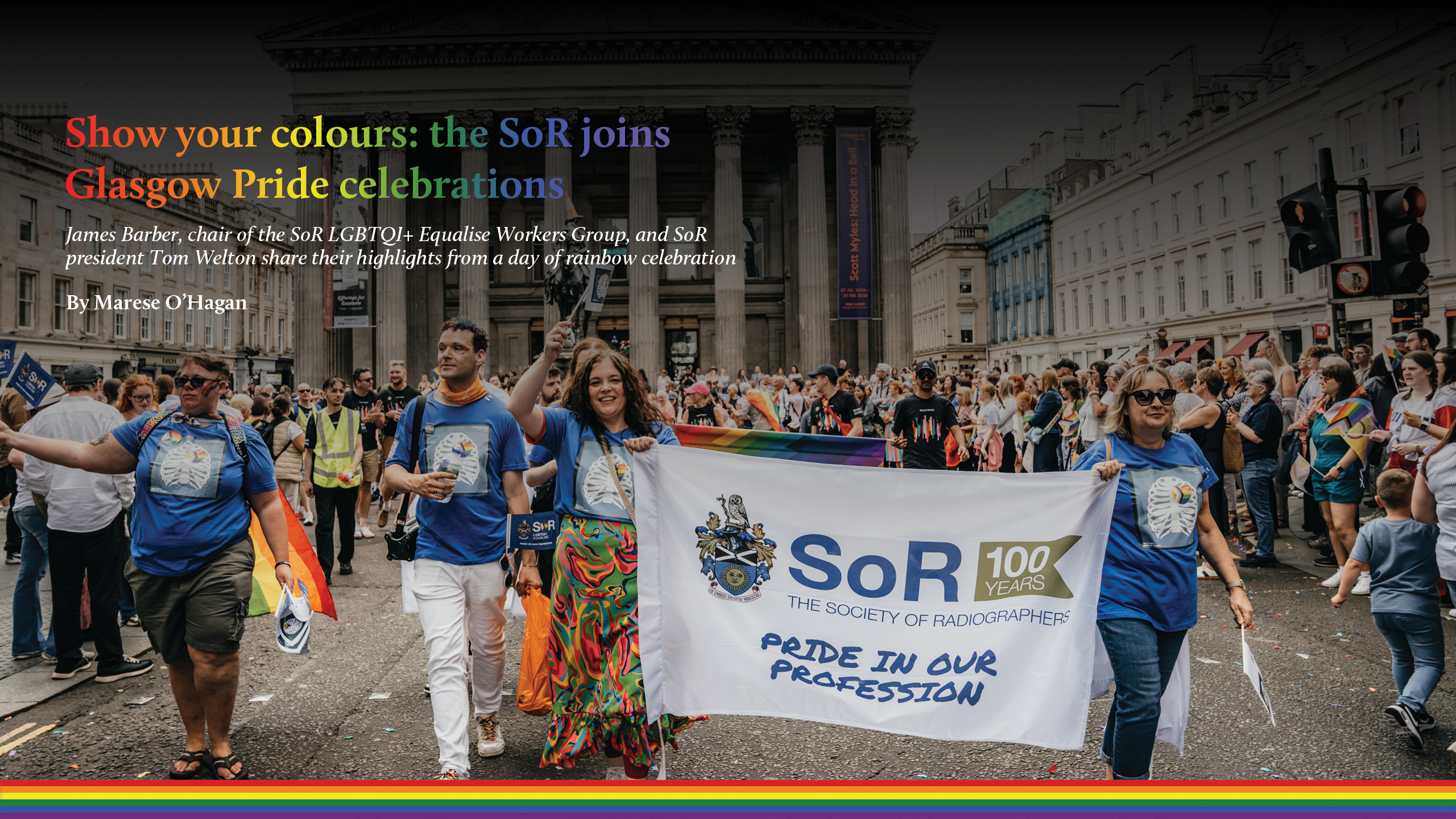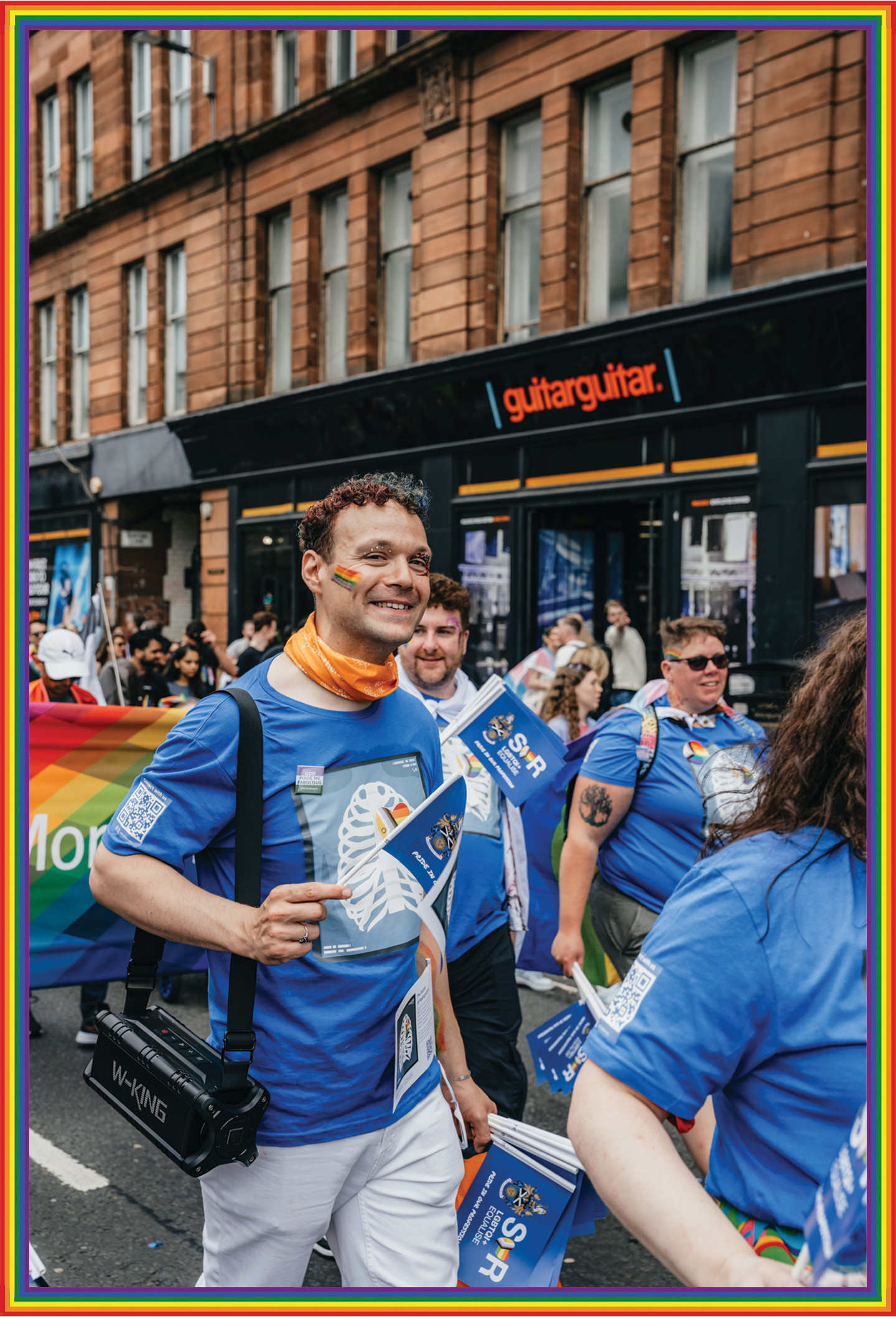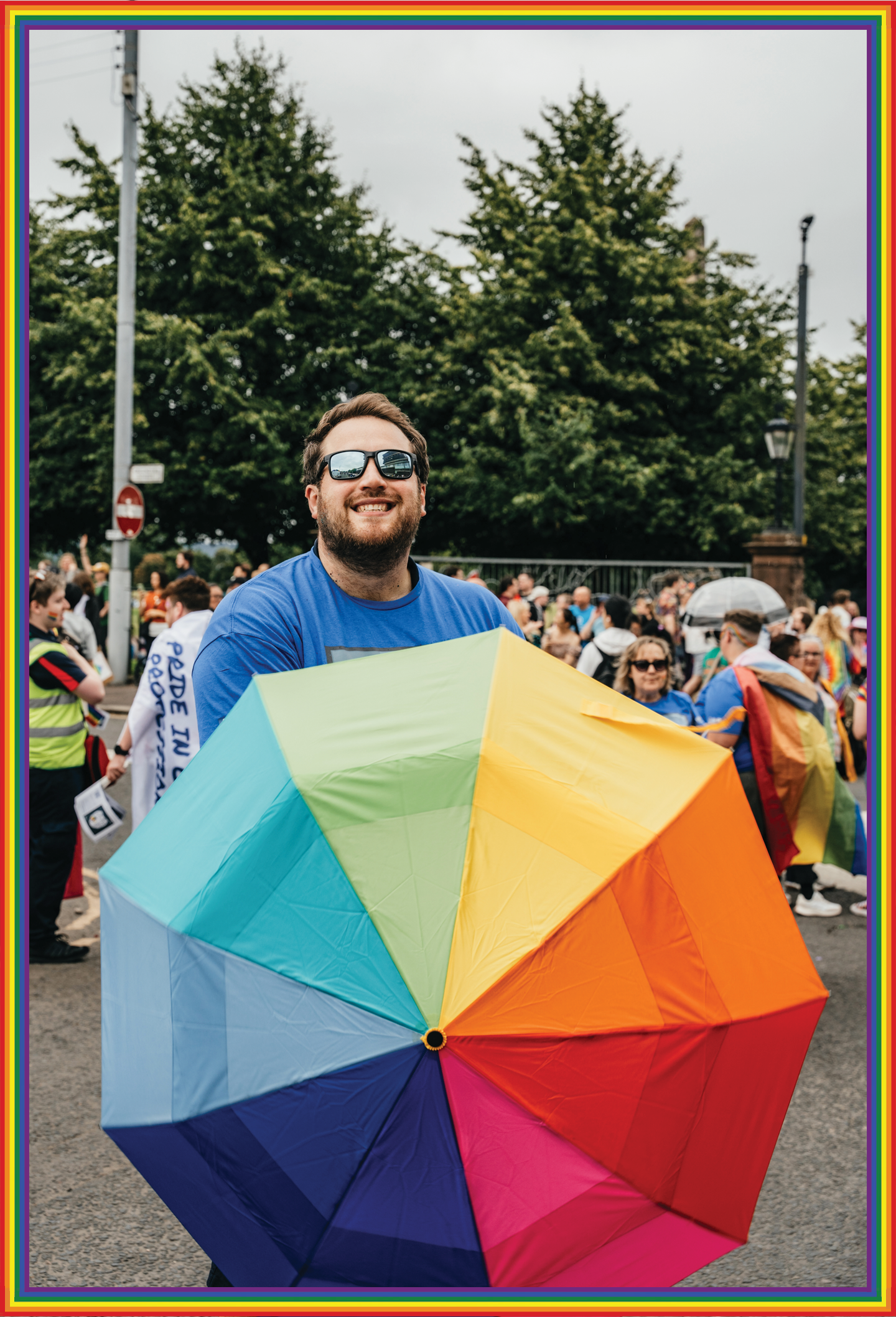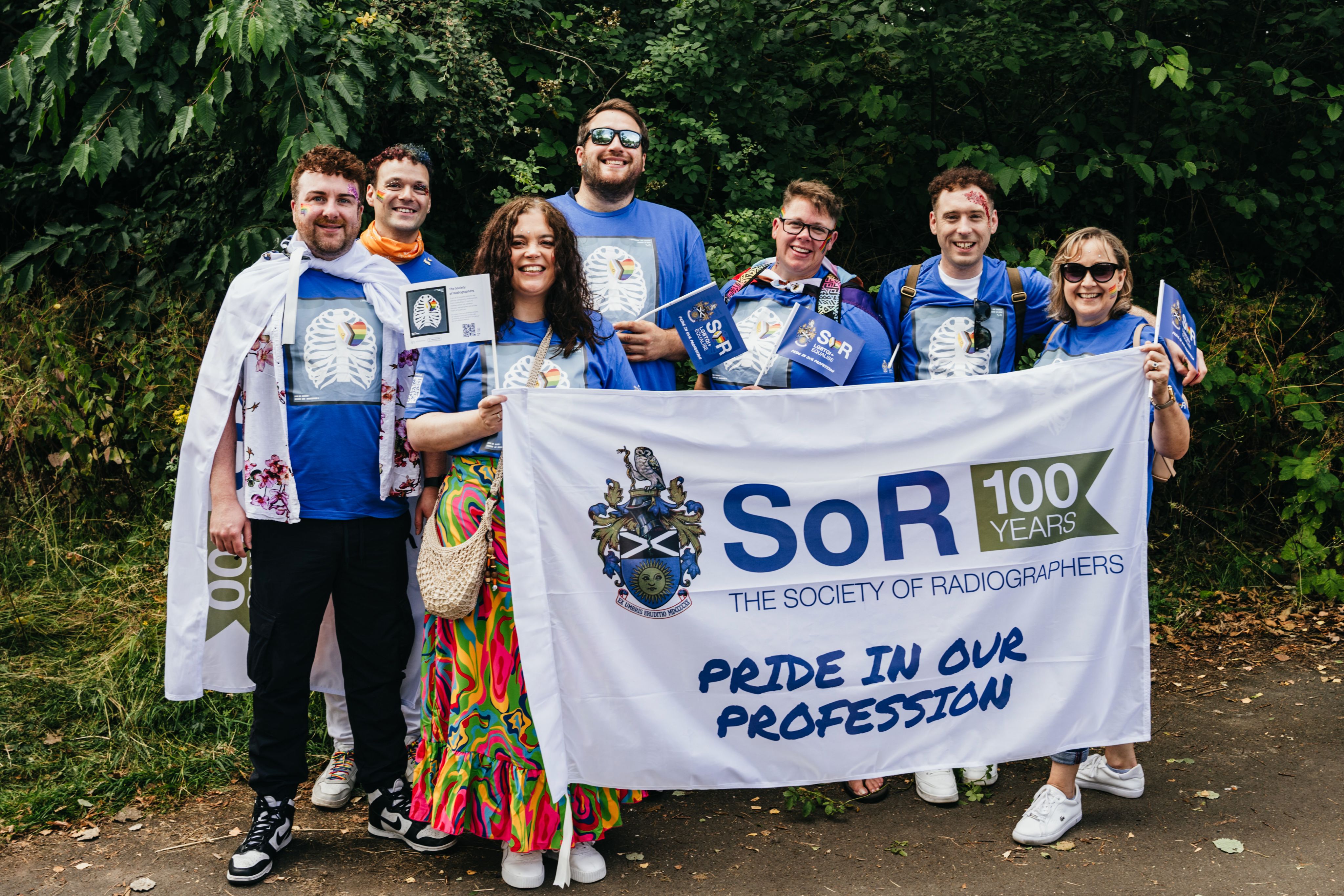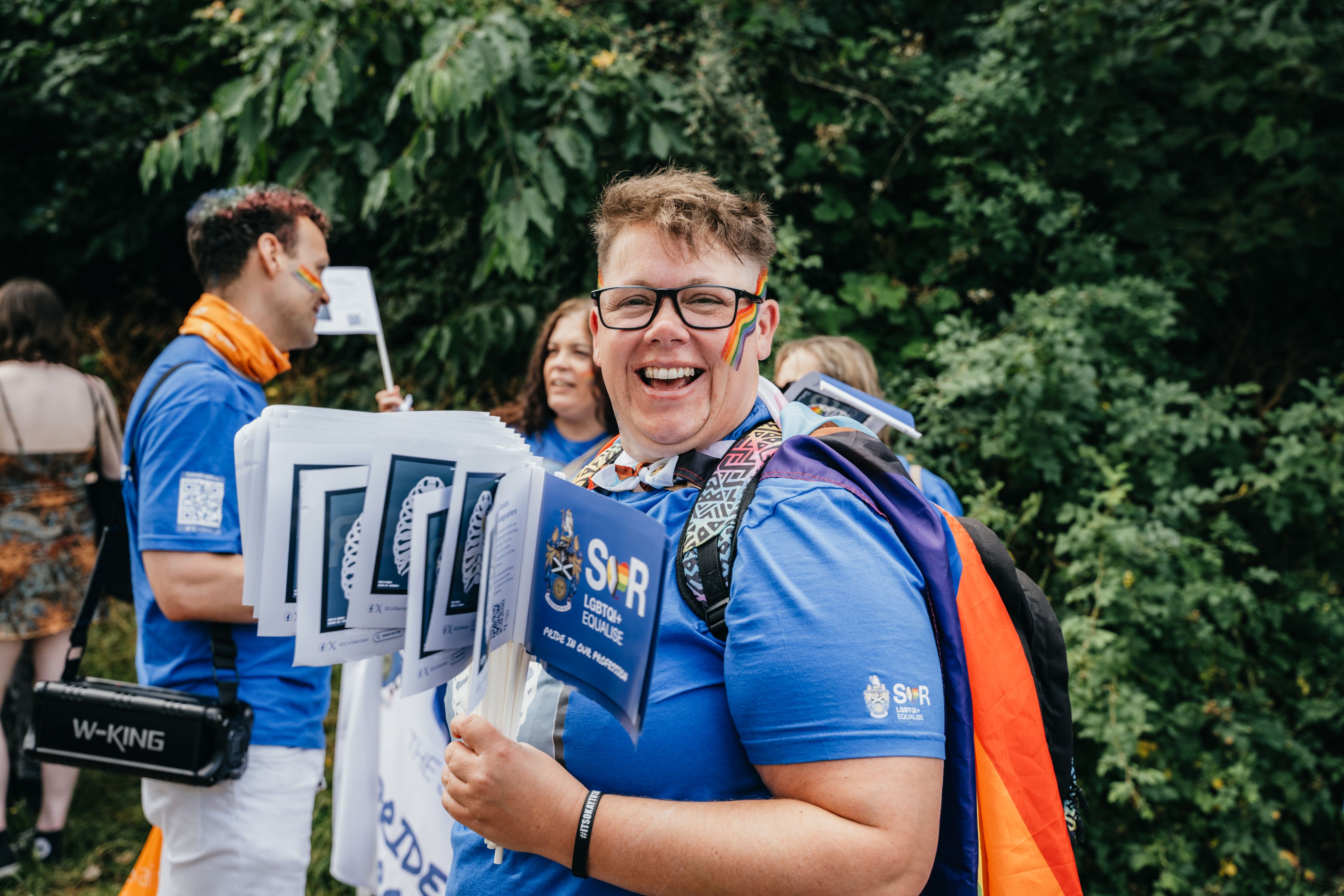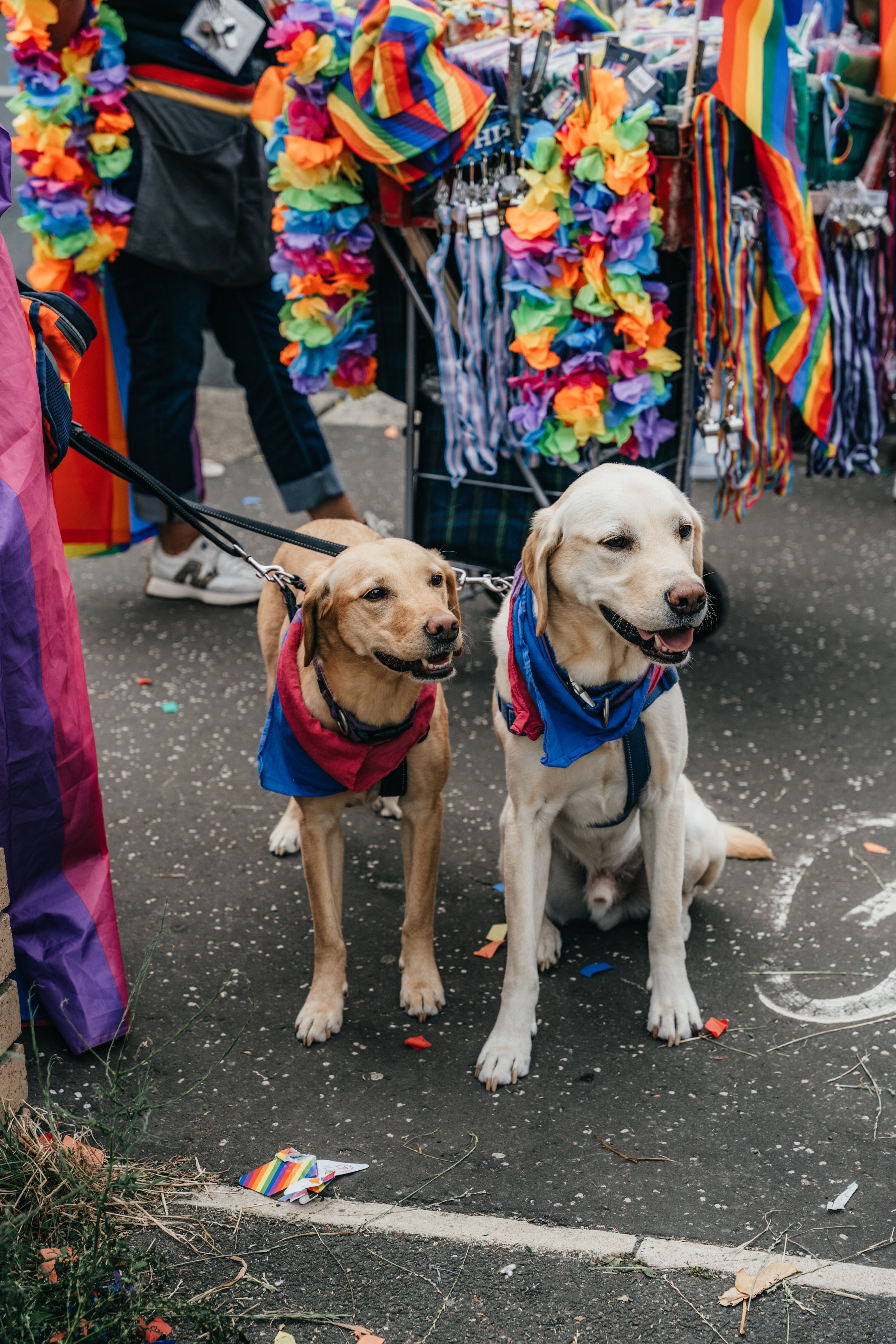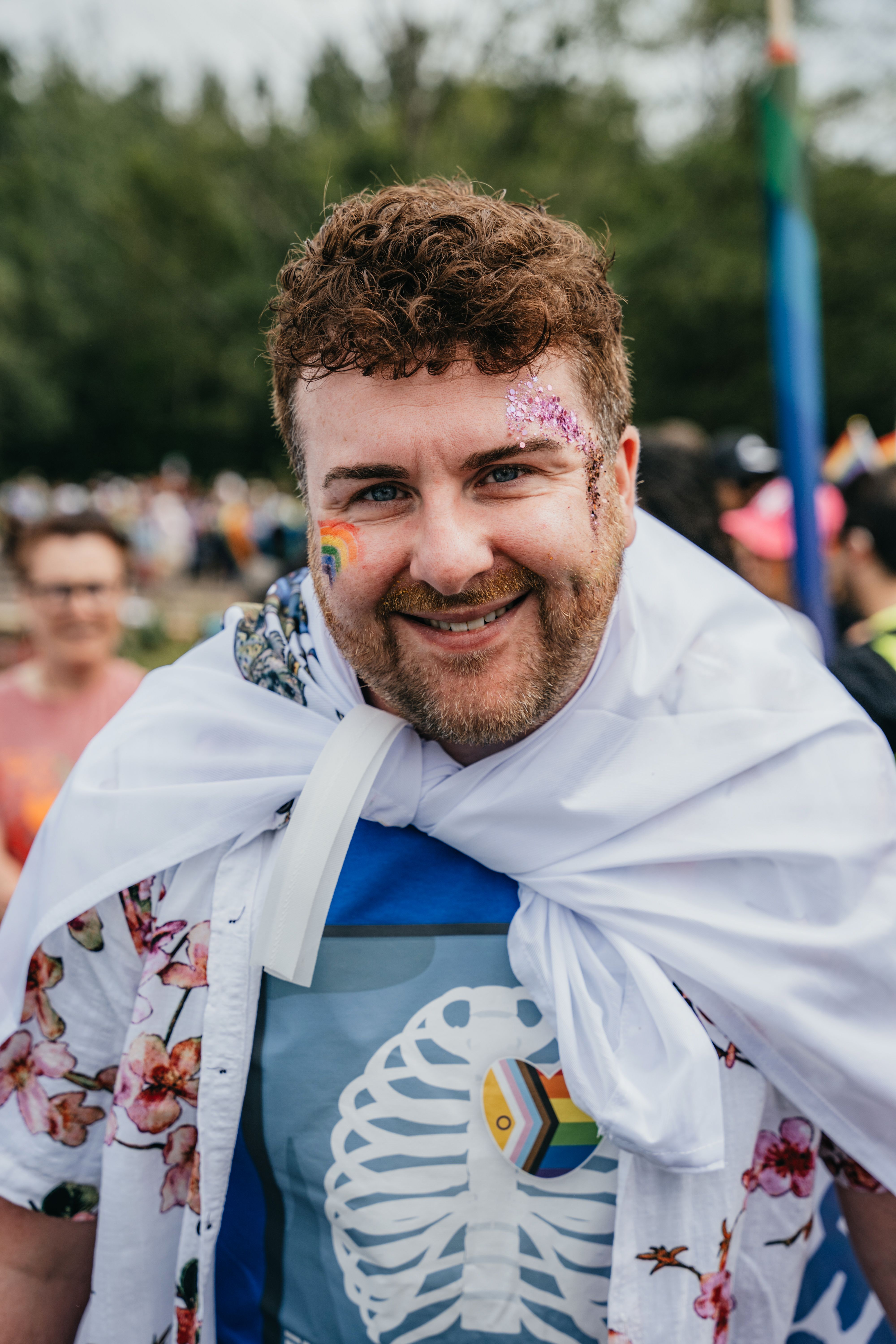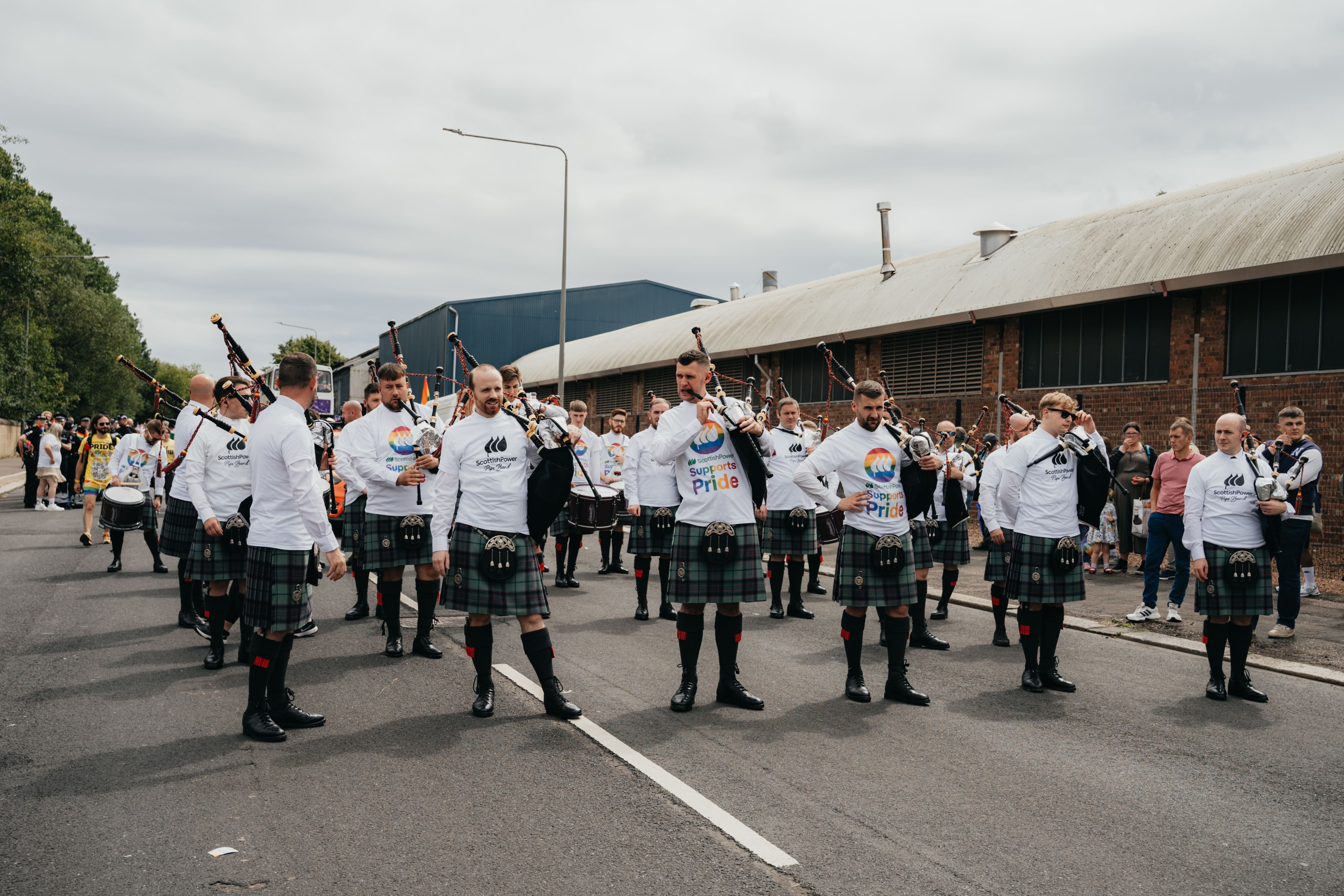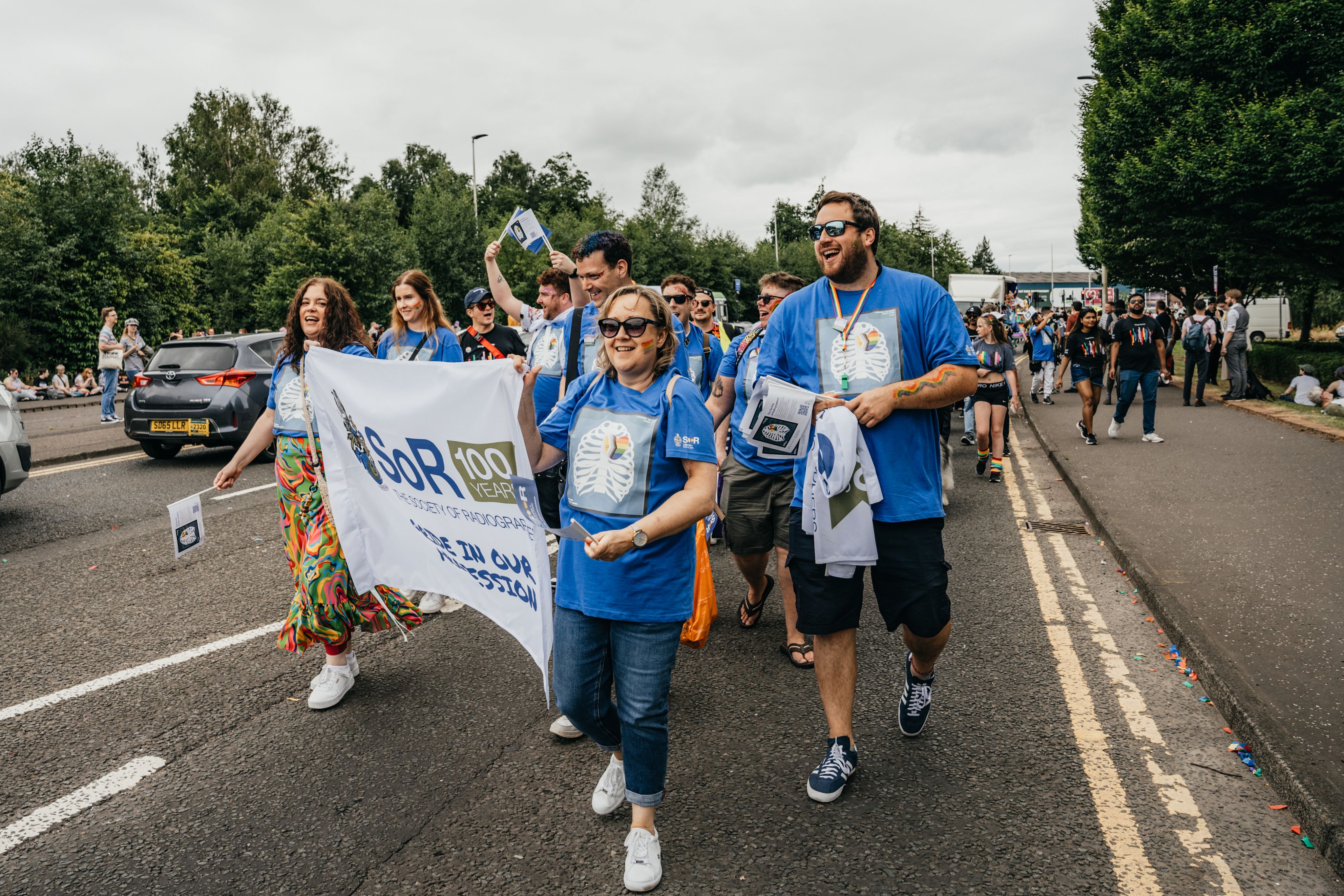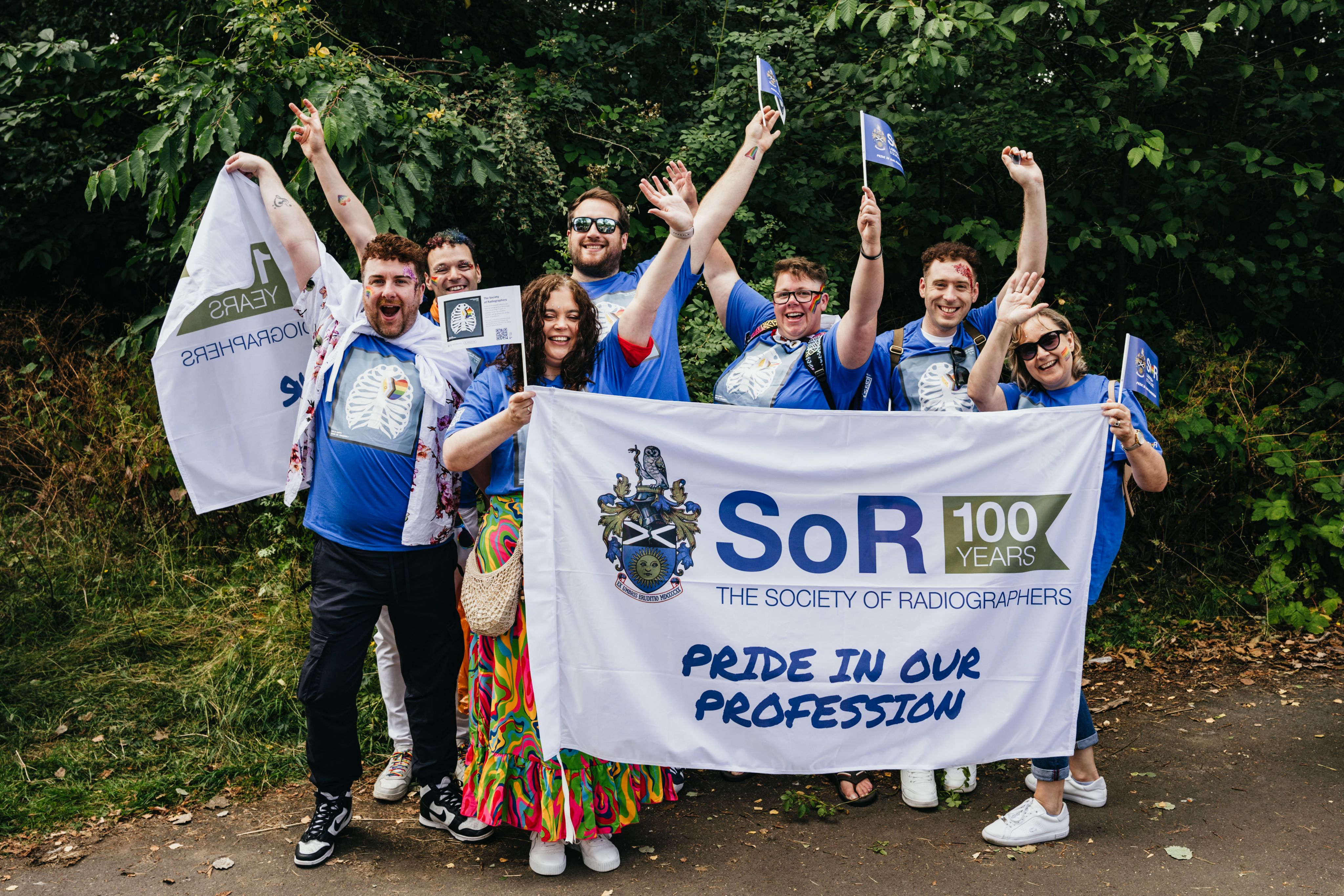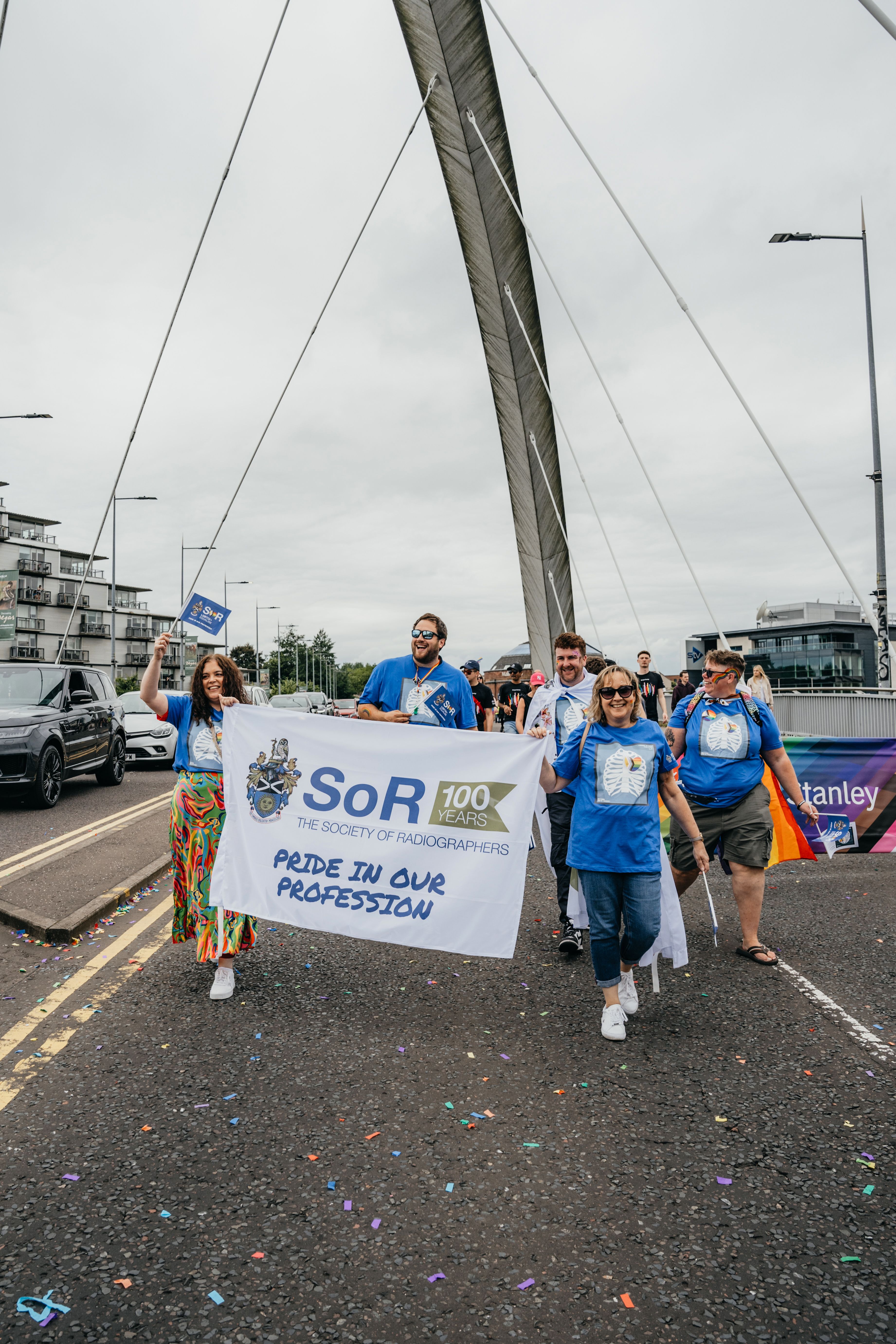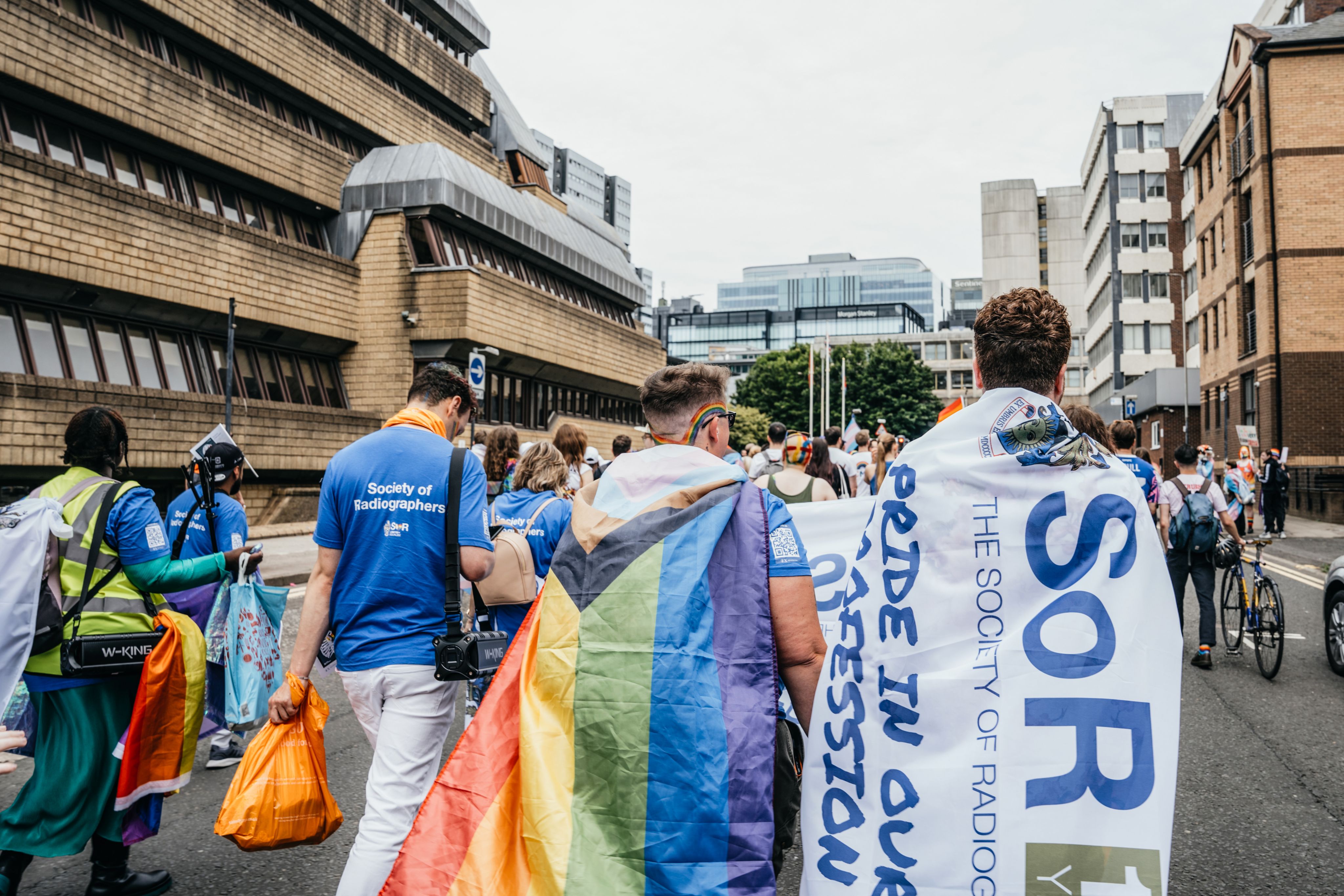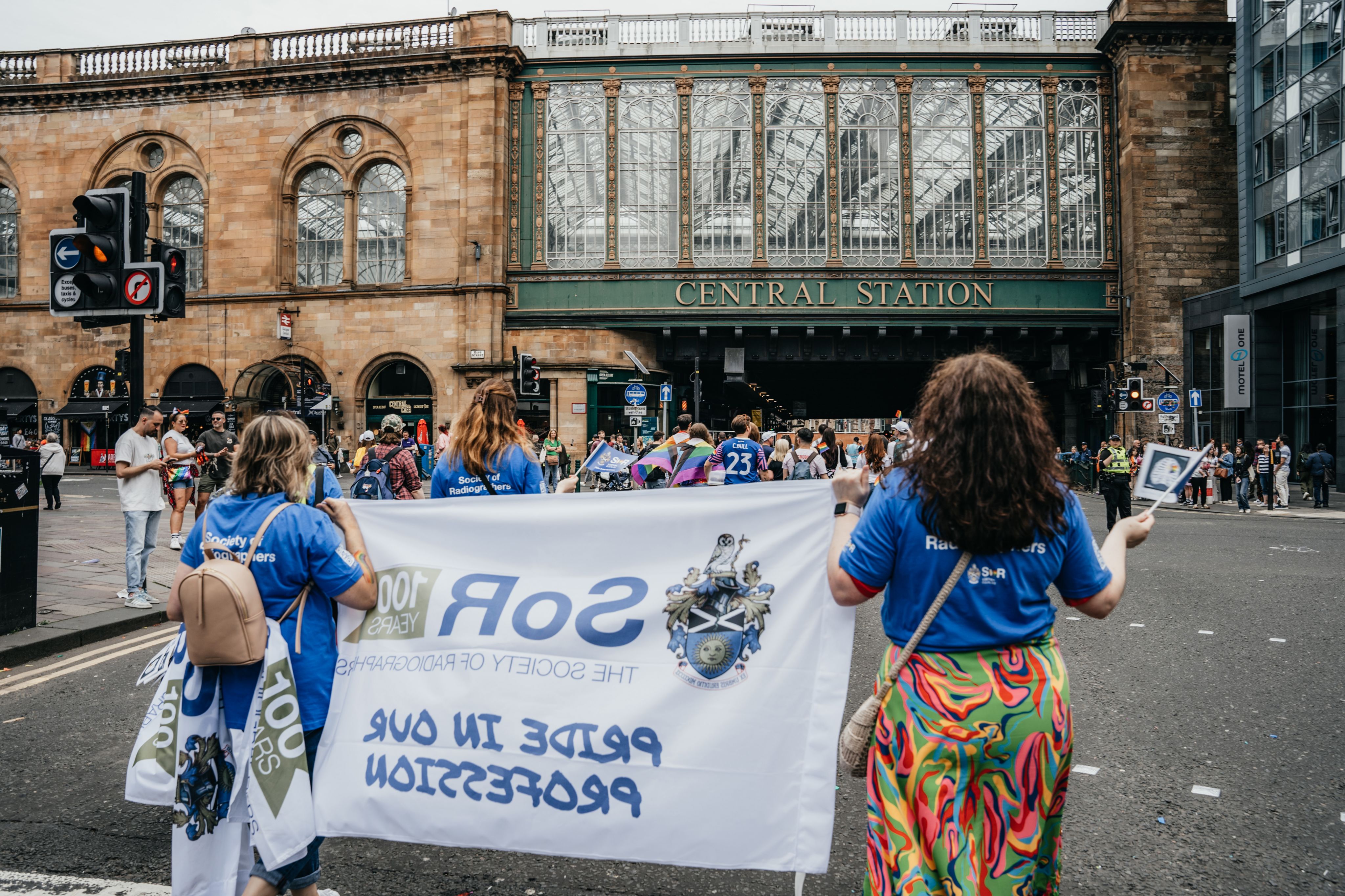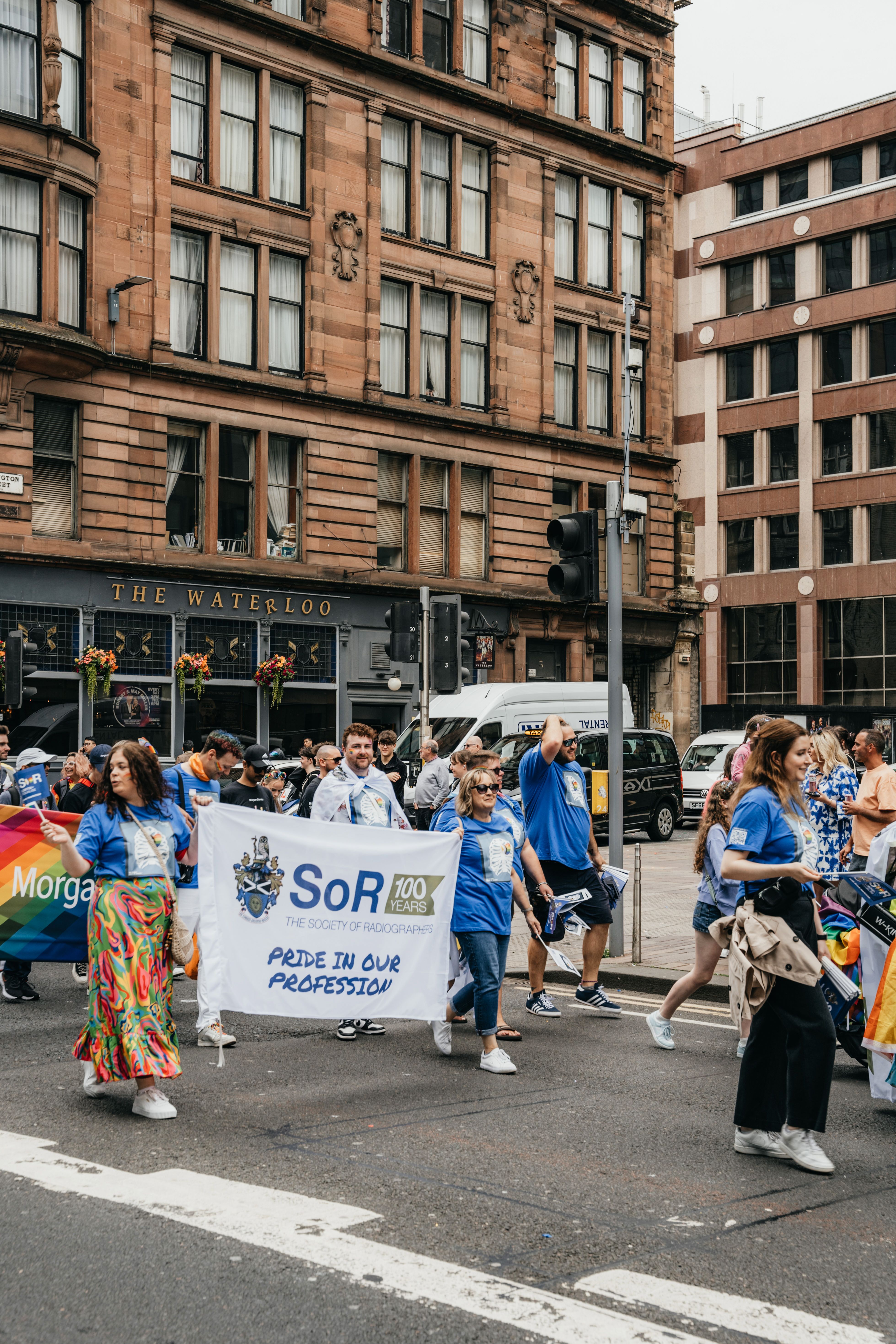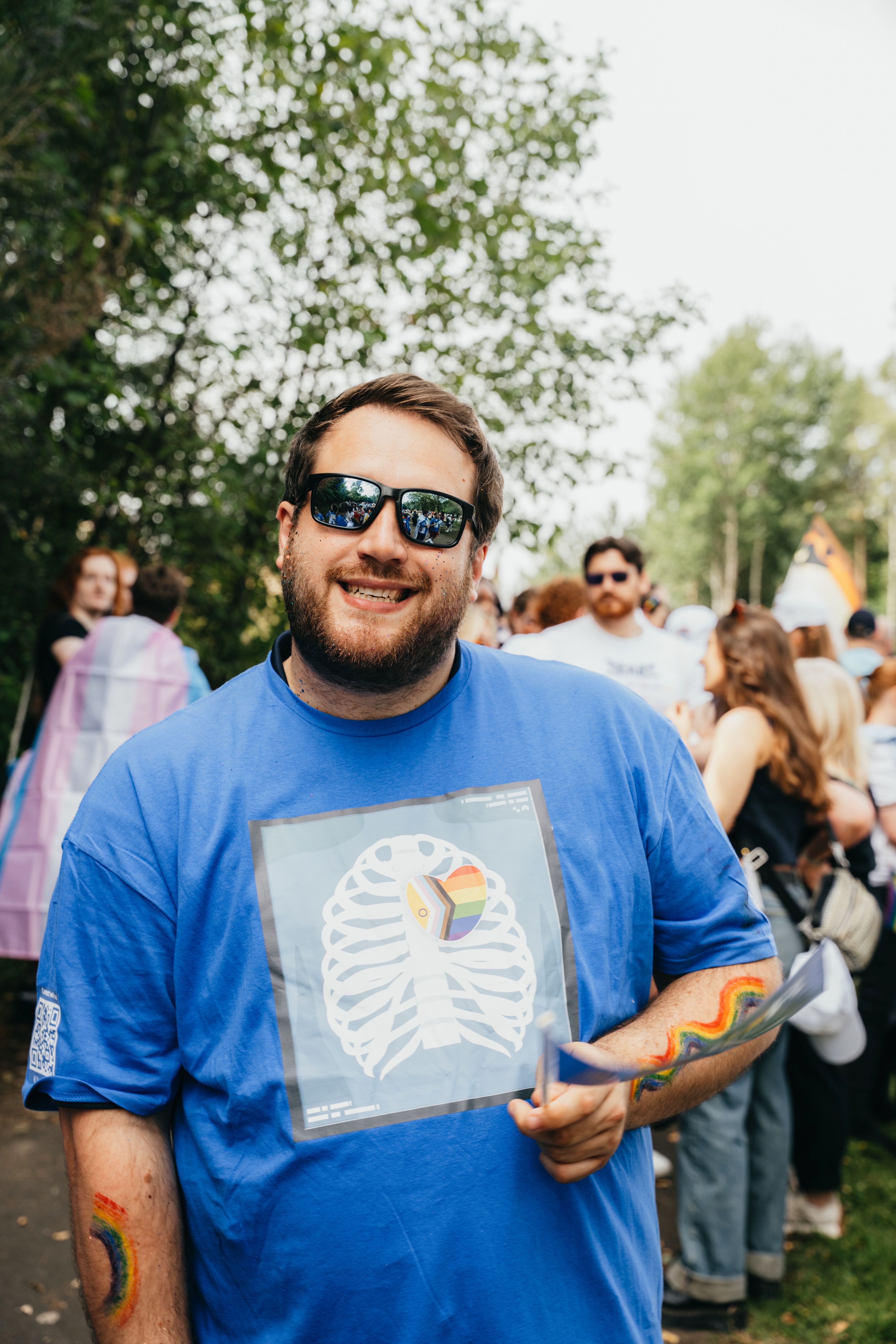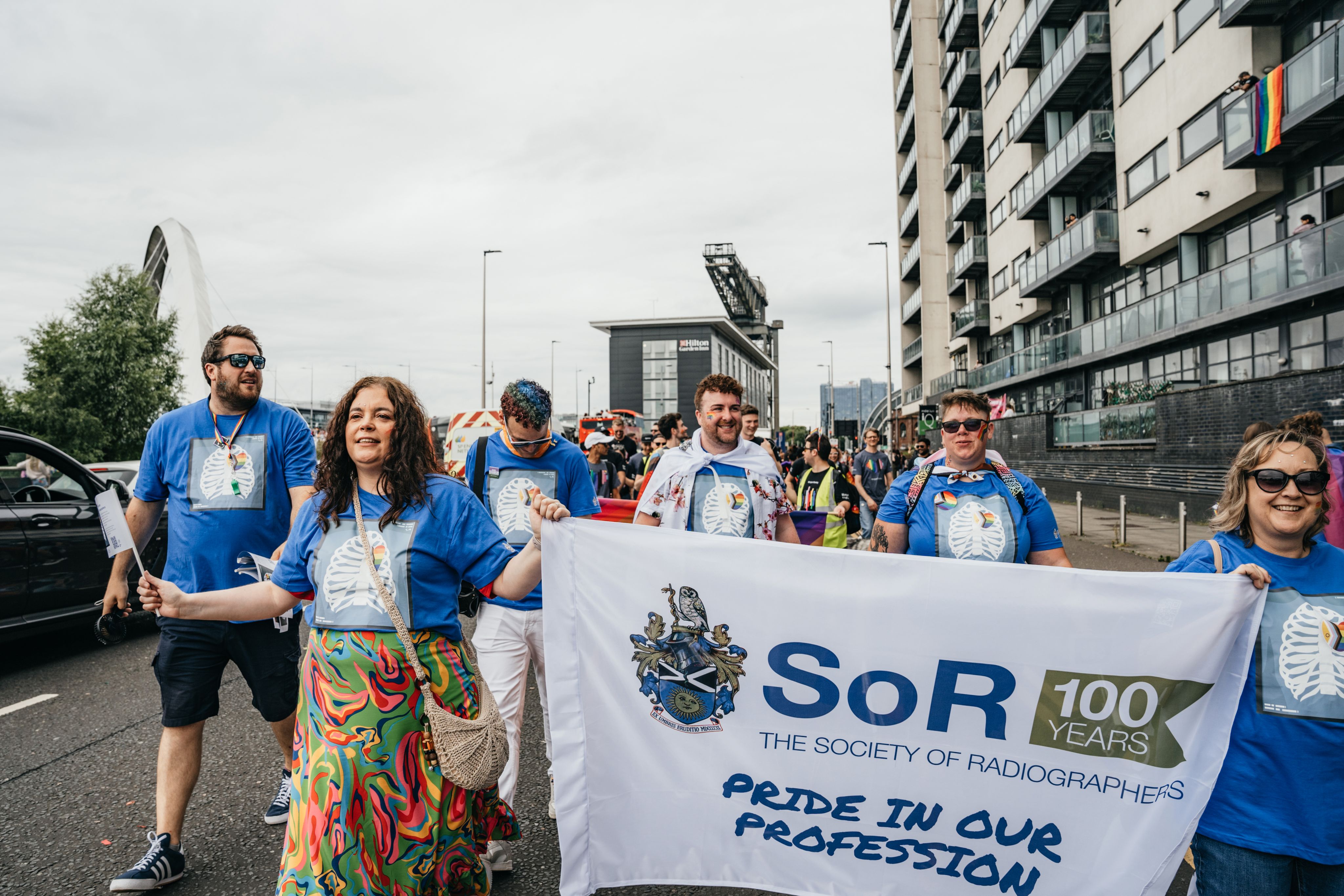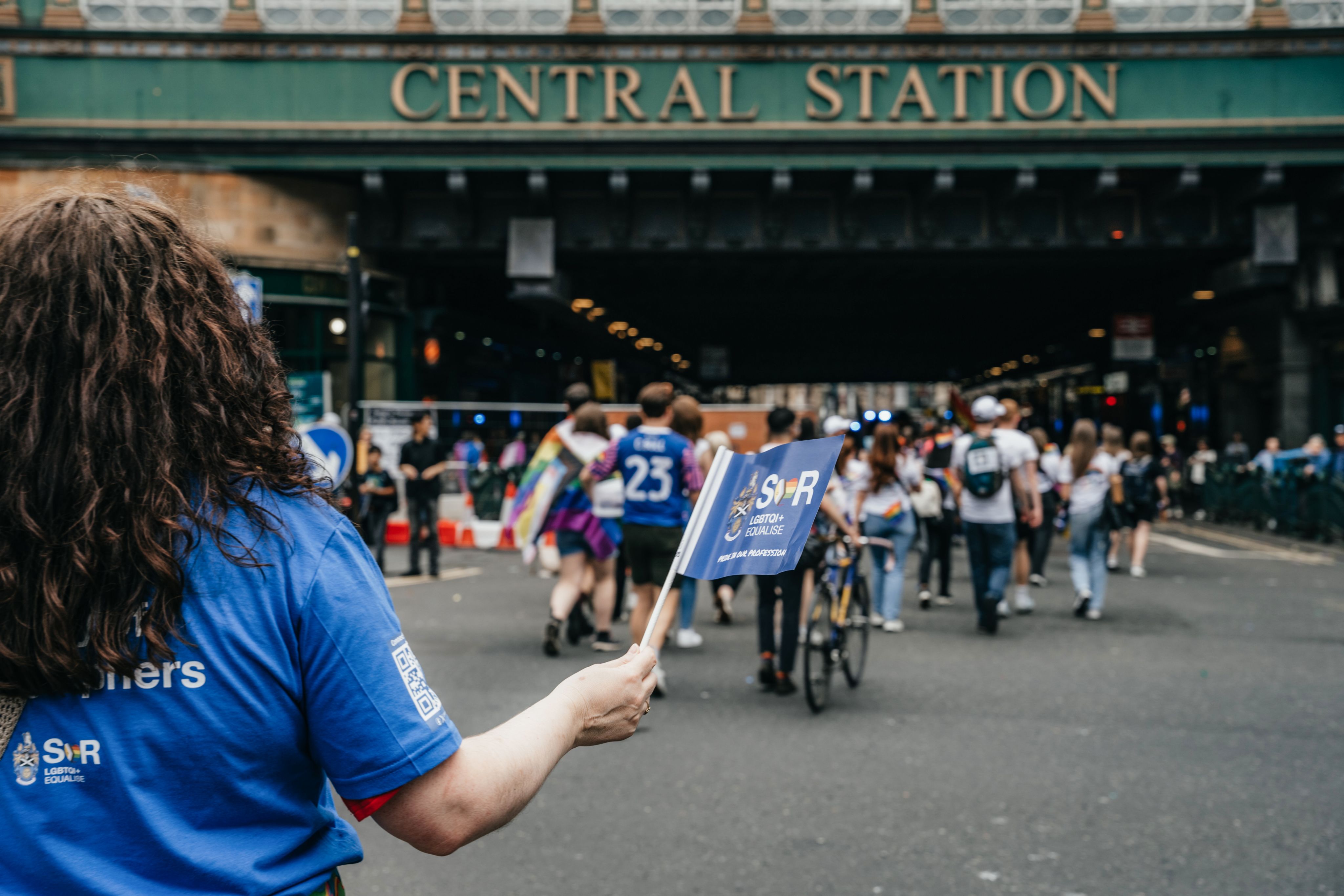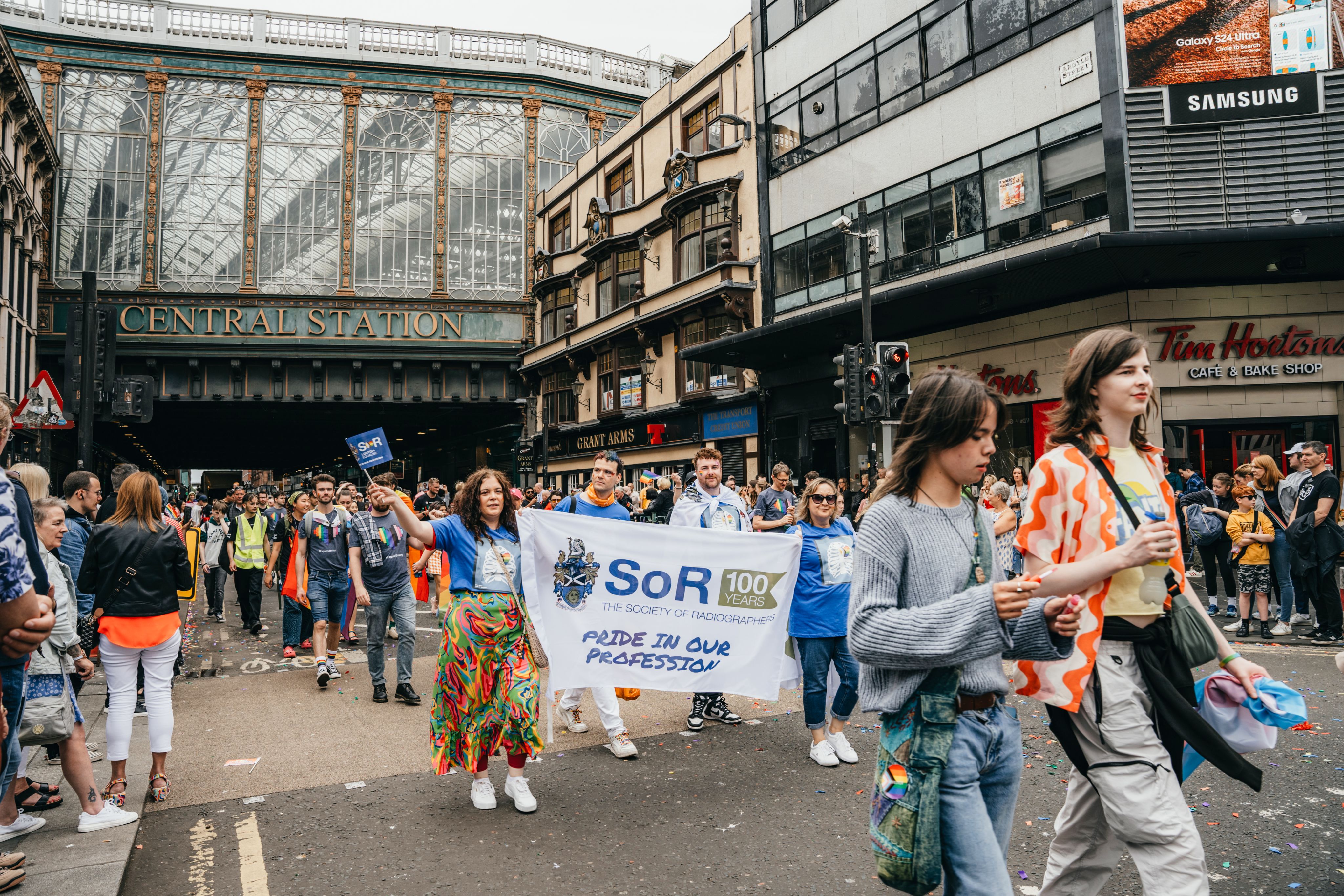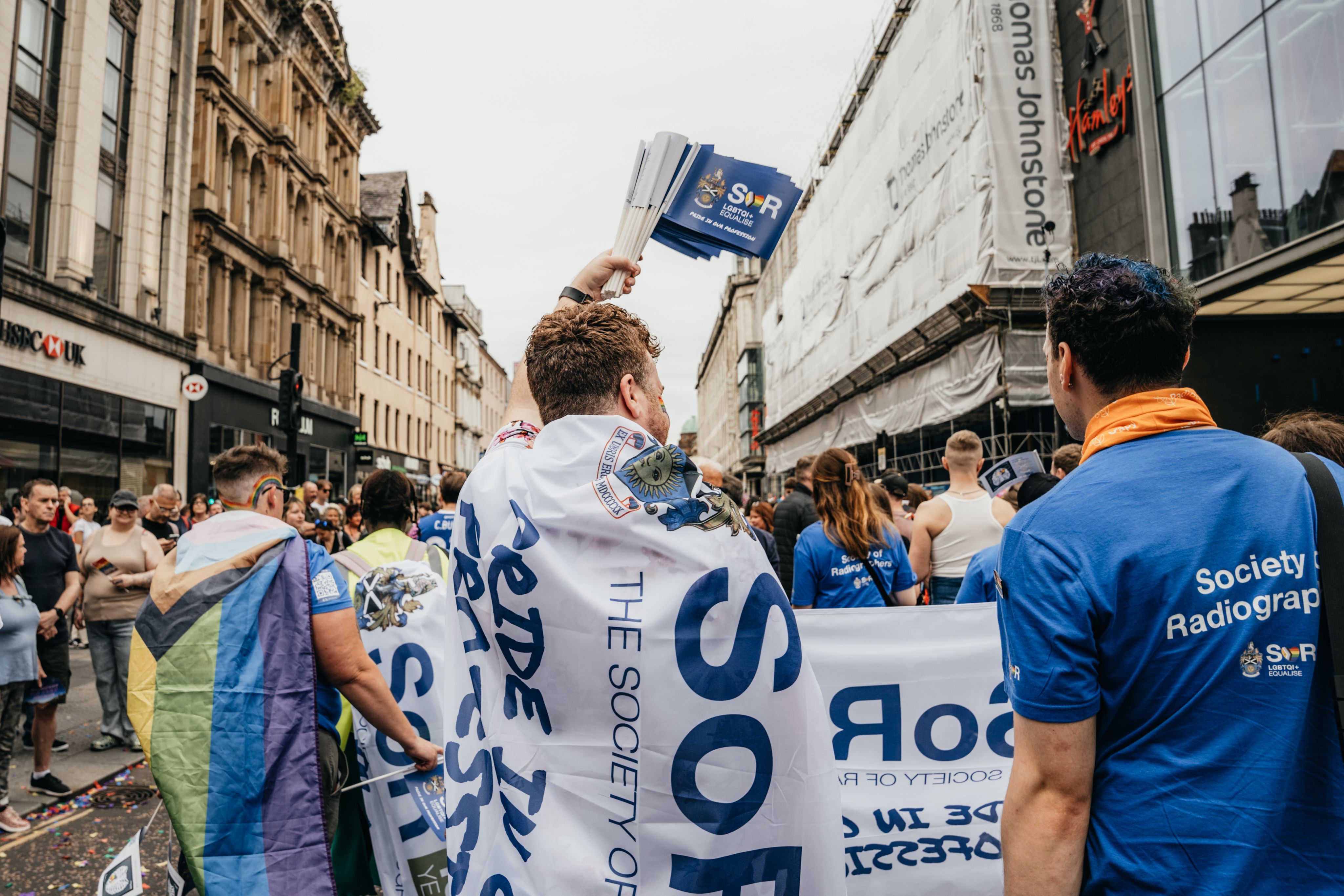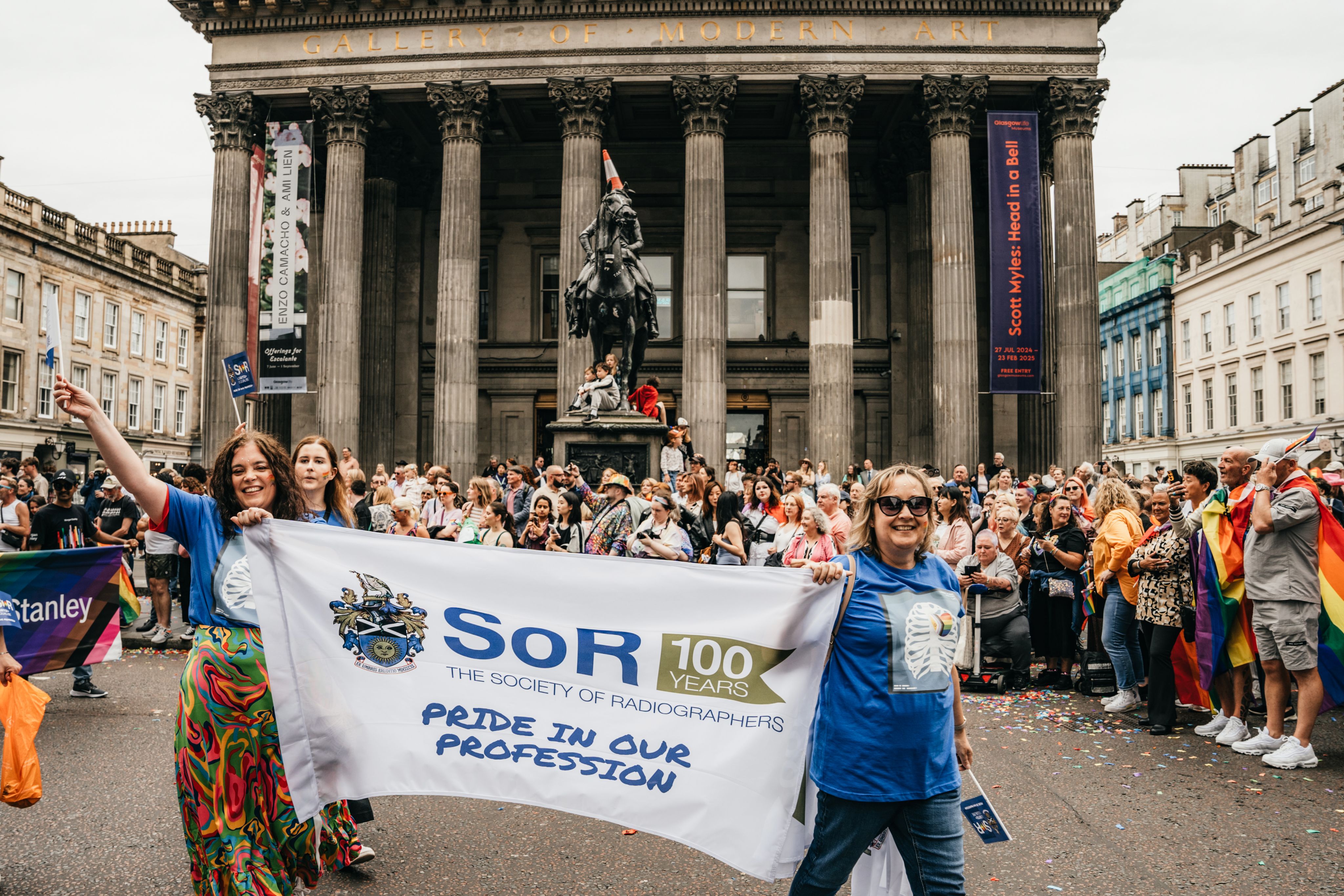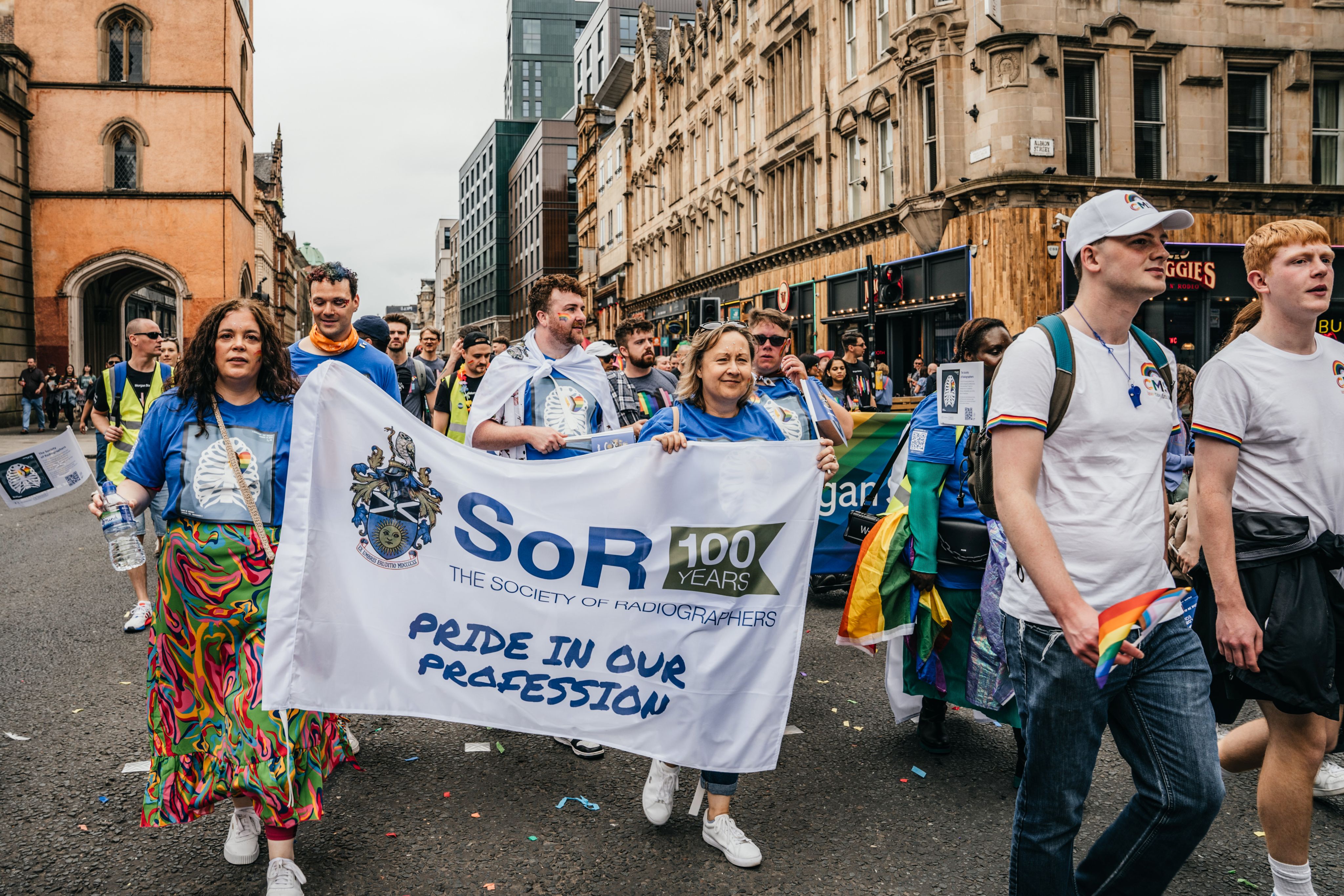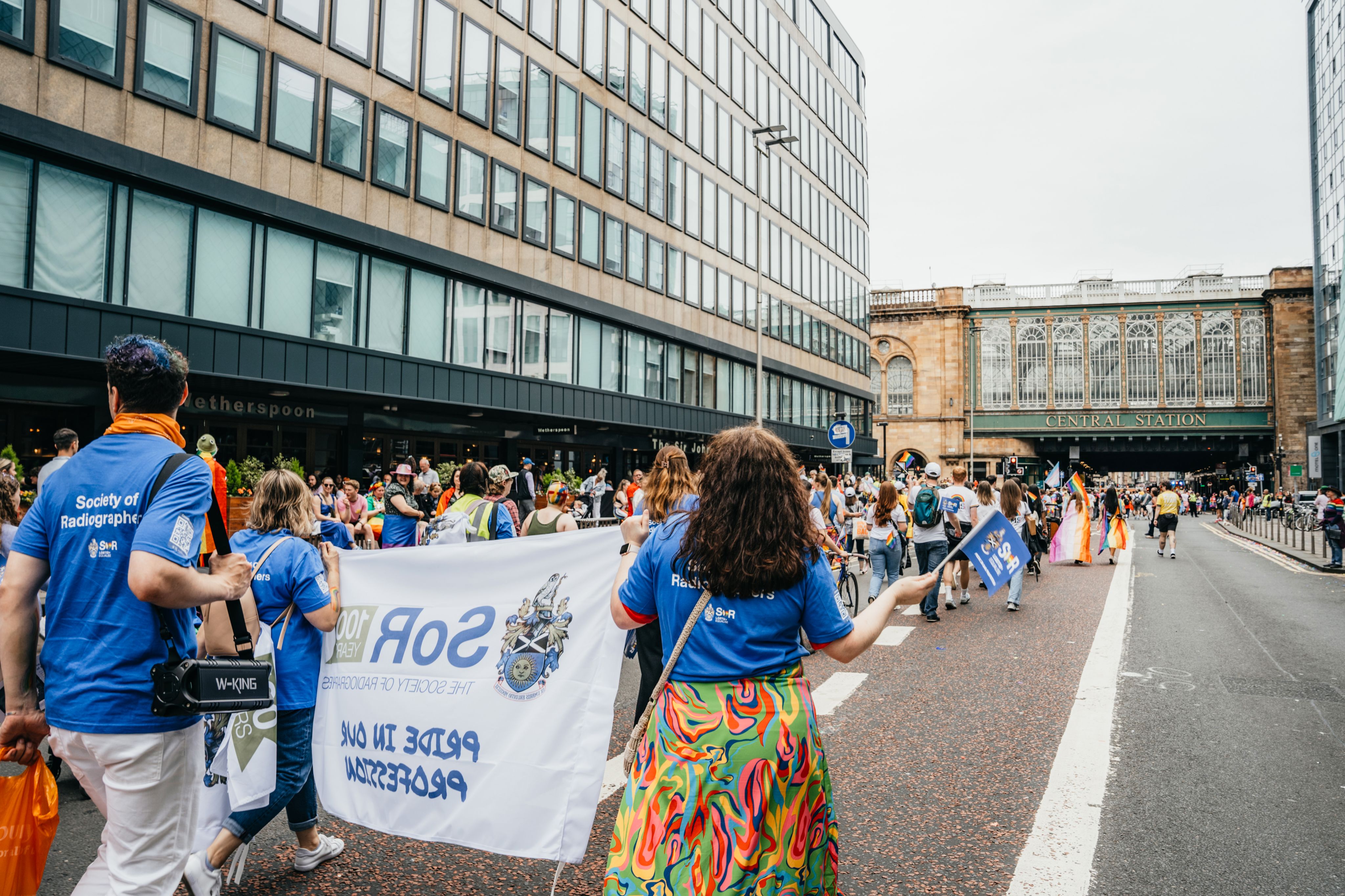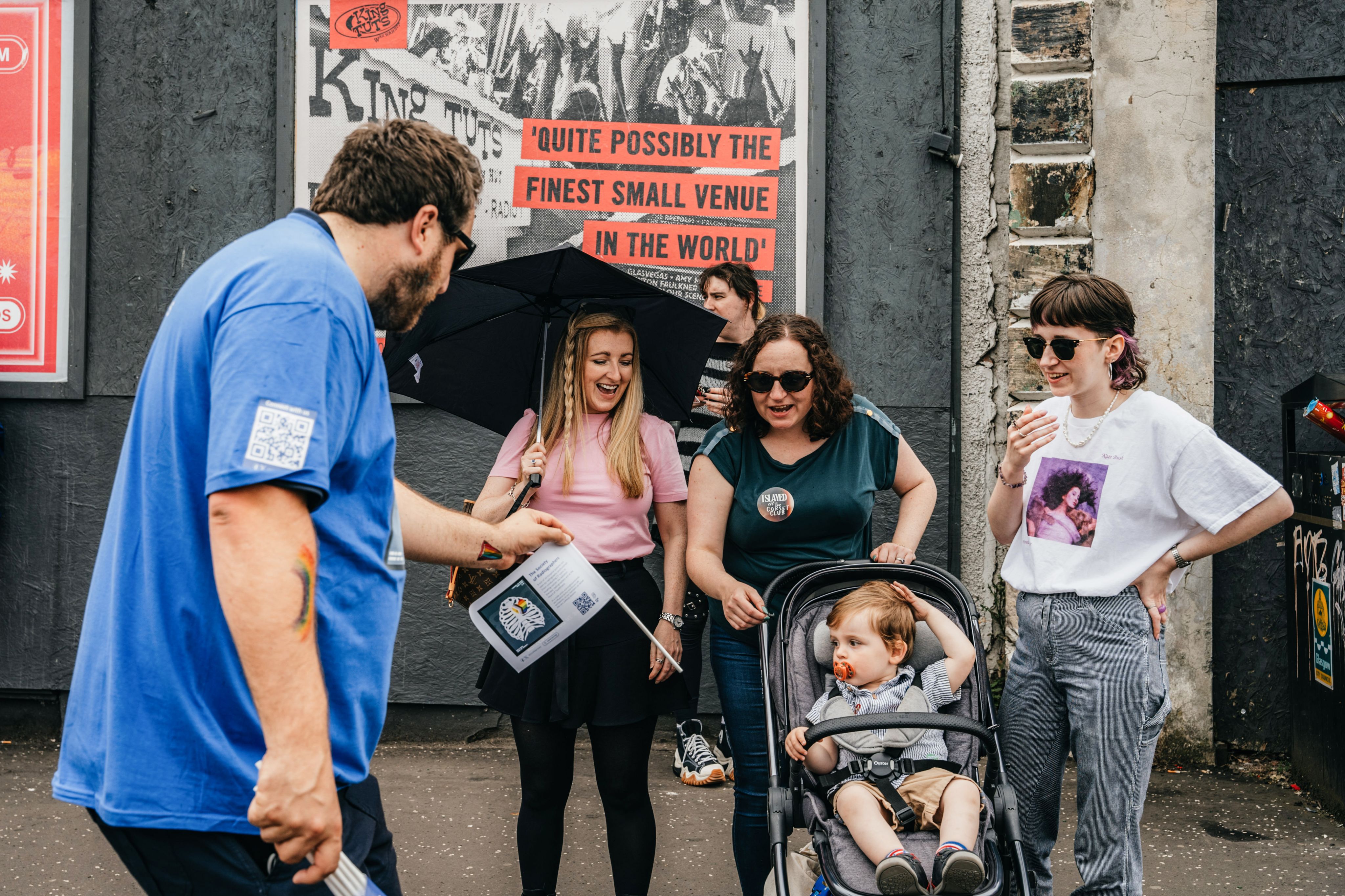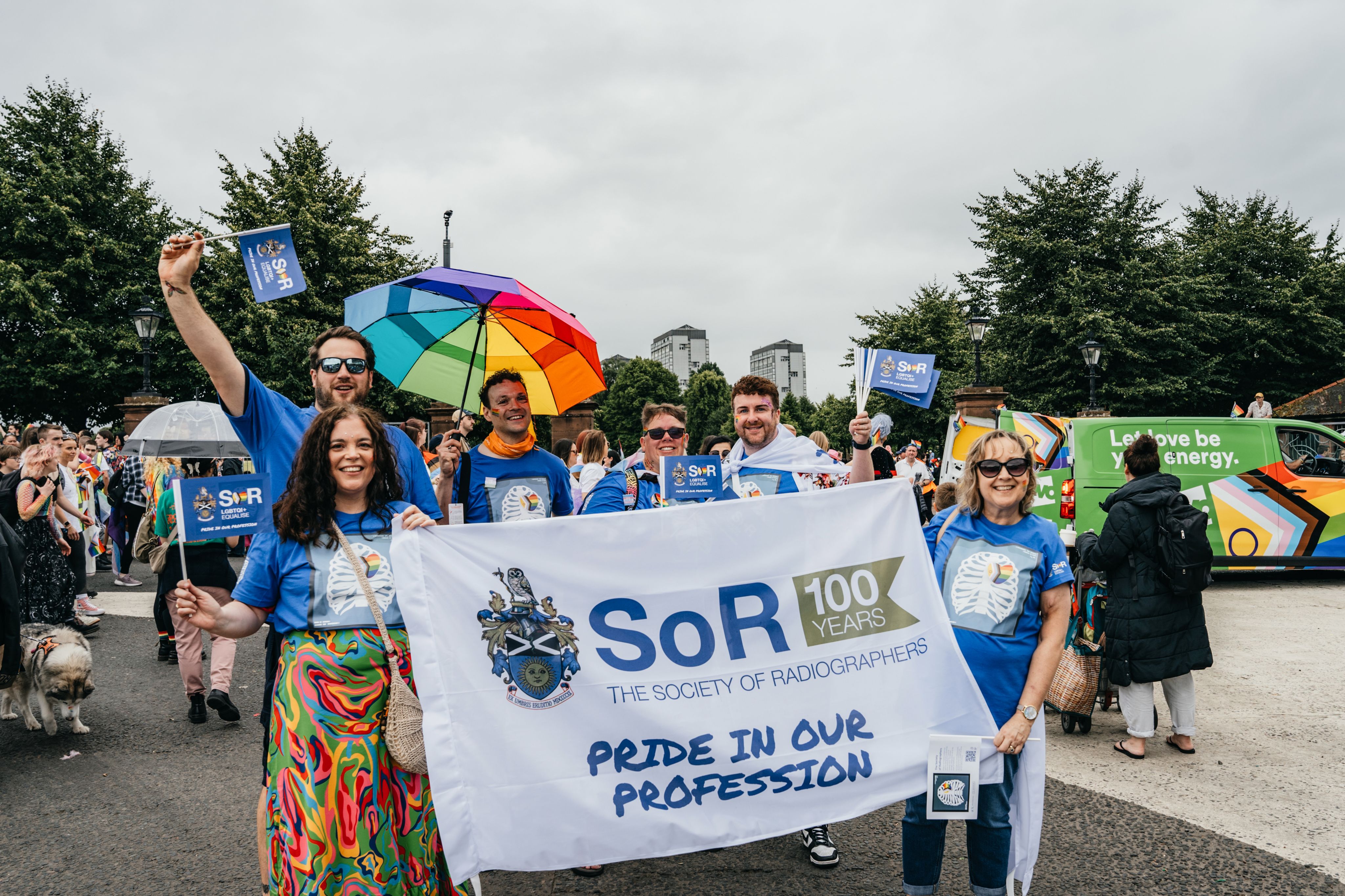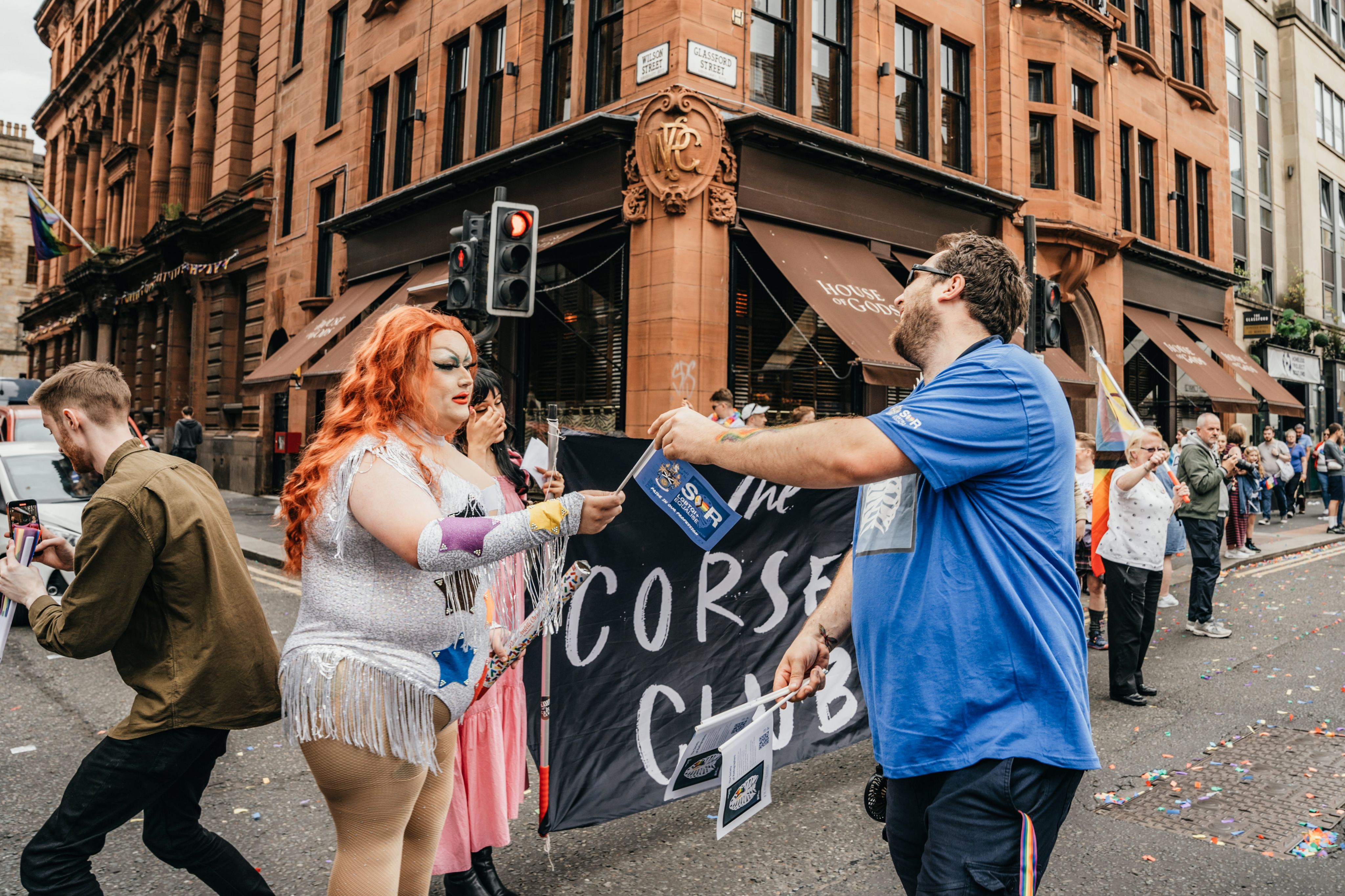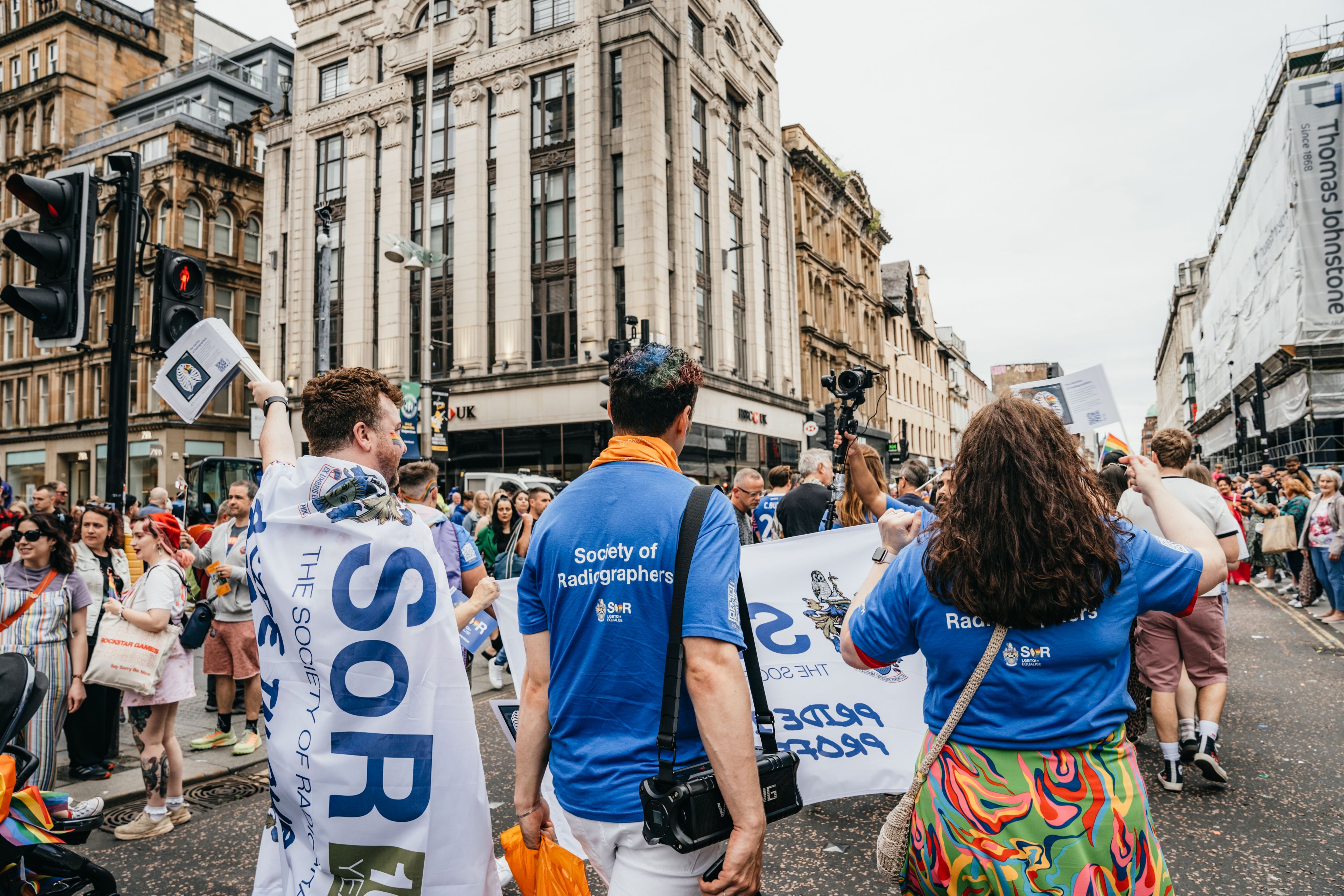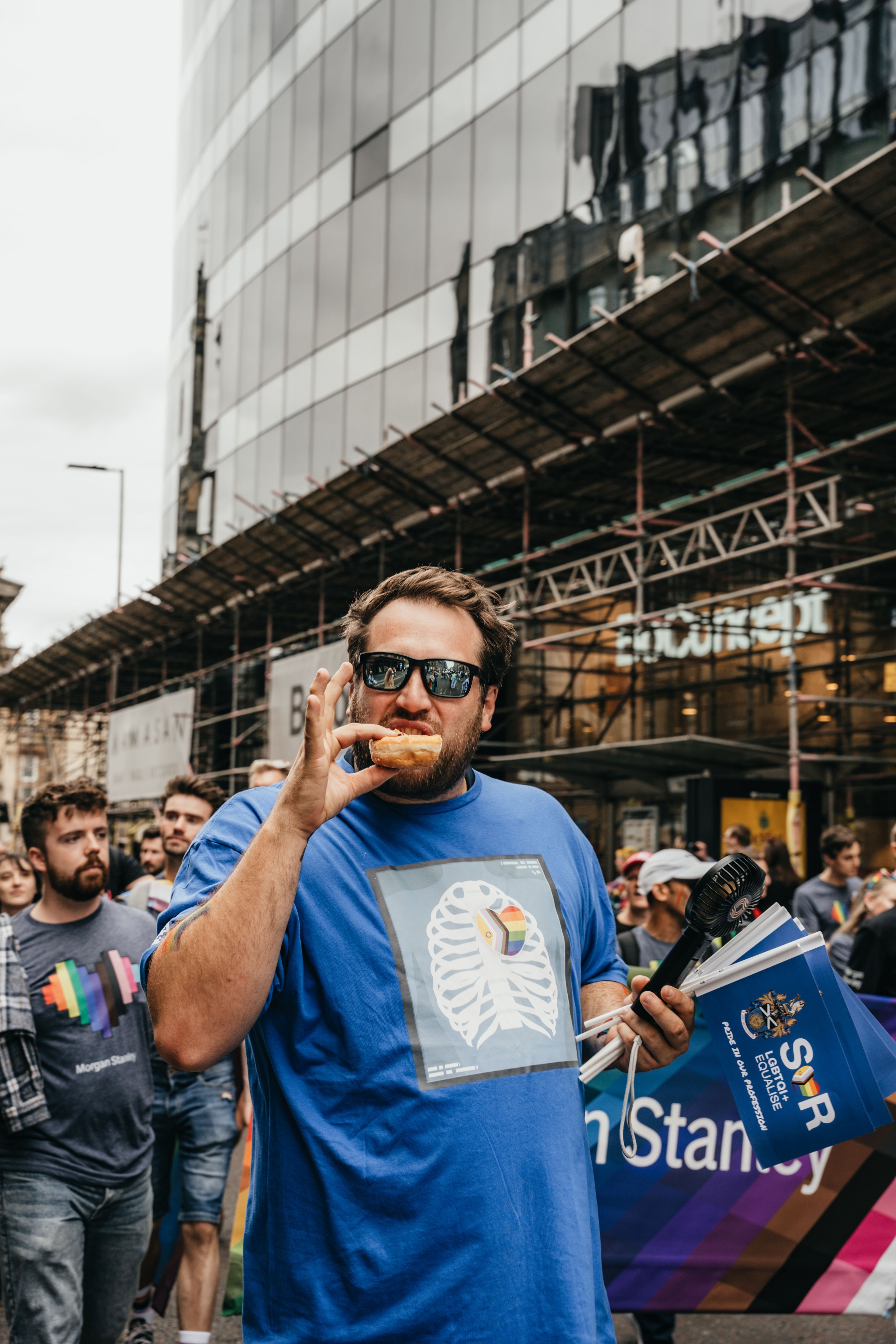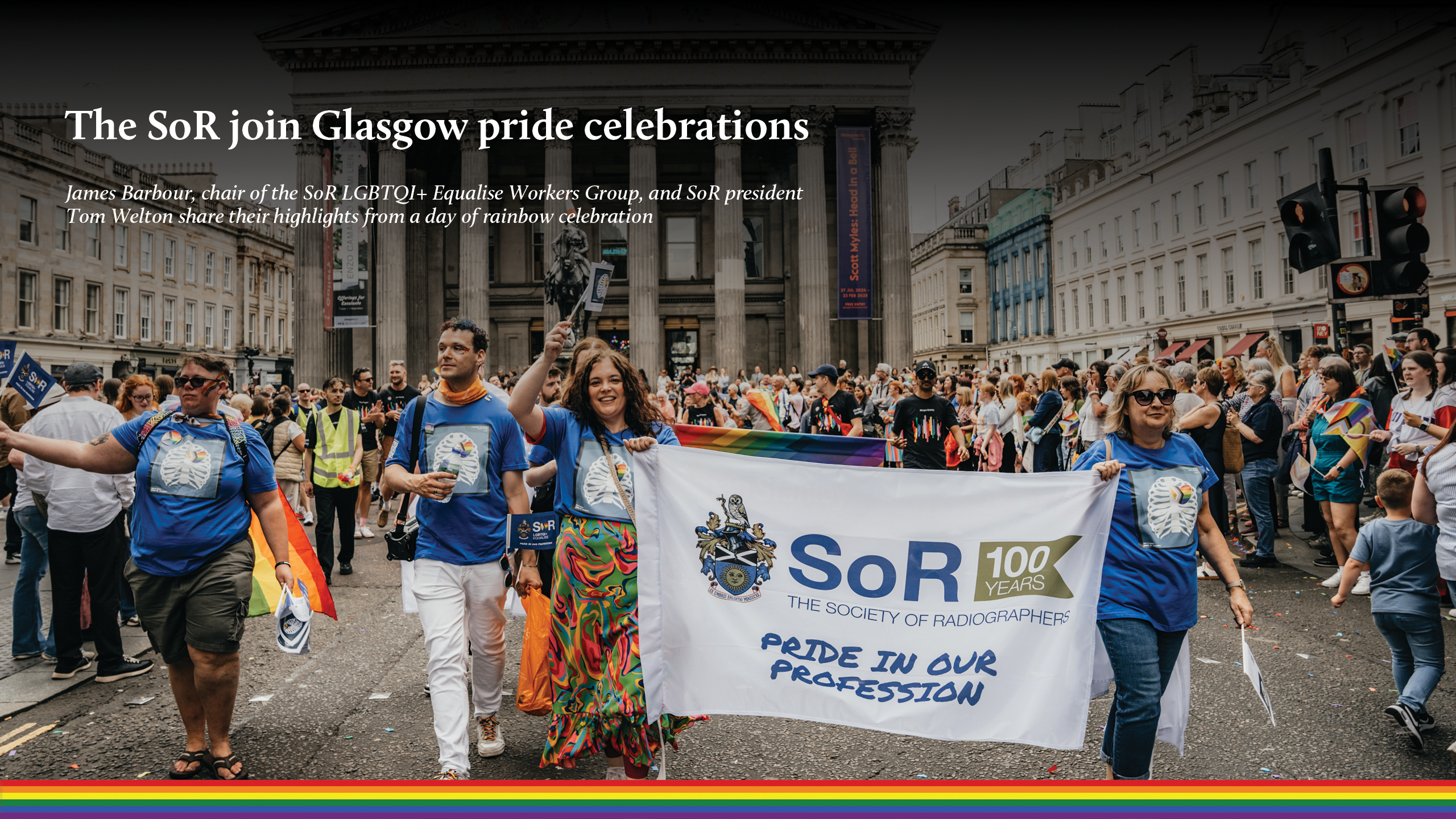
Amid the marchers at Glasgow’s Pride – one of the UK’s largest annual Pride gatherings – SoR represenƒtatives hold banners, brandish flags and wave at supporters lined up on either side of the Pride route.
Stretching from Festival Park to Whistler on the Green, the march is packed with attendees representing an array of companies and organisations. Rest assured, there is no shortage of glitter, rainbow face paint or temporary tattoos – not least among SoR members. “Pride is great fun to come to,” says James Barber, chair of the SoR LGBTQI+ Equalise Workers Group, whose hair has been spray-painted into rainbow colours. “I think it’s great to go out there and show that it’s a big part of who we are as a profession.”
The SoR’s presence at Glasgow’s Pride, which took place on 20 July, follows attendances at Belfast Pride and London Pride over the years. This emphasises the society’s commitment to its message of inclusivity, according to James. “It’s great to come around all the different devolved nations, rather than just staying in England,” he continues. “We think it’s important to show members that everyone is welcome in the group, no matter where they’re based.”
“It’s good to show that the society is inclusive – it does support these things.”
Amid the marchers at Glasgow’s Pride – one of the UK’s largest annual Pride gatherings – SoR representatives hold banners, brandish flags and wave at supporters lined up on either side of the Pride route.
Stretching from Festival Park to Whistler on the Green, the march is packed with attendees representing an array of companies and organisations. Rest assured, there is no shortage of glitter, rainbow face paint or temporary tattoos – not least among SoR members. “Pride is great fun to come to,” says James Barber, chair of the SoR LGBTQI+ Equalise Workers Group, whose hair has been spray-painted into rainbow colours. “I think it’s great to go out there and show that it’s a big part of who we are as a profession.”
The SoR’s presence at Glasgow’s Pride, which took place on 20 July, follows attendances at Belfast Pride and London Pride over the years. This emphasises the society’s commitment to its message of inclusivity, according to James. “It’s great to come around all the different devolved nations, rather than just staying in England,” he continues. “We think it’s important to show members that everyone is welcome in the group, no matter where they’re based.”
“It’s good to show that the society is inclusive – it does support these things.”
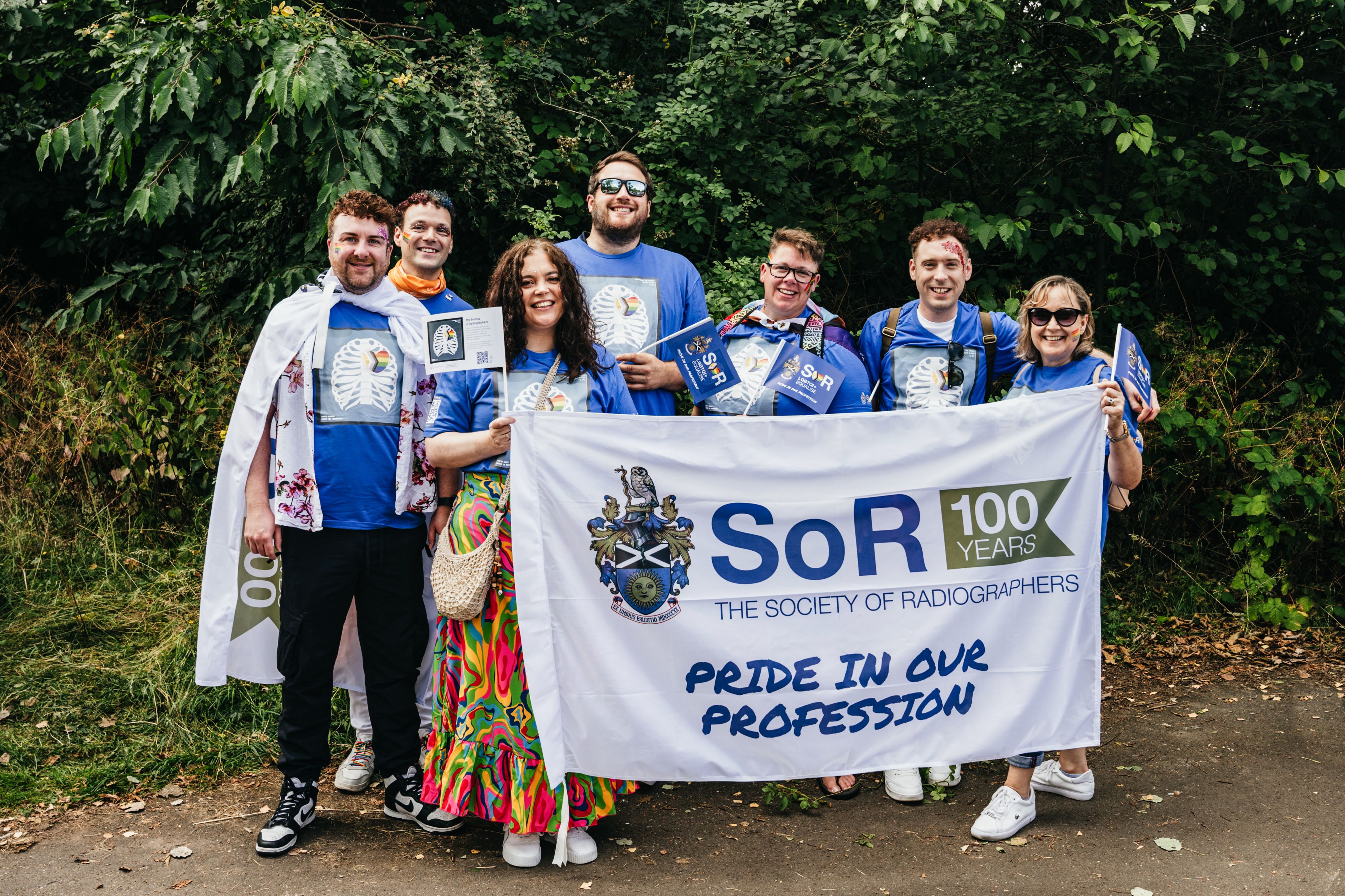
The SoR team at Glasgow Pride
The SoR team at Glasgow Pride
A Society for all
Glasgow’s Pride is one of Tom Welton’s first events as SoR president. He was inaugurated into the role in July at a ceremony in Manchester Hall’s Goulburn Lodge.
For Tom, Glasgow’s Pride represents an opportunity to reflect on the diversity within the SoR cohort. “The Pride movement is a celebration; it’s a carnival and a highly positive expression of how far our society has come in terms of equality and awareness of the individual,” he says. “At the SoR, our membership is beautifully diverse, and it is important to recognise this. Our society has come a long way, which thankfully allows us to celebrate the success of activists.”
But the implicit meaning behind attending such a celebration is not lost on him. “It is clear to me, however, that the world is far from perfect,” Tom continues. “With staggering rises in hate crime against LGTBQ+ people and global political parties – including those in the UK – fuelling a divisive and demonising rhetoric, we must not get complacent in our principles.
“I stand shoulder to shoulder with all – all who face violence, bullying and harassment. I stand shoulder to shoulder with all SoR members. Thousands marched the streets of Glasgow, and I am proud to be one of them and proud the SoR was there.”
A Society for all
Glasgow’s Pride is one of Tom Welton’s first events as SoR president. He was inaugurated into the role in July at a ceremony in Manchester Hall’s Goulburn Lodge.
For Tom, Glasgow’s Pride represents an opportunity to reflect on the diversity within the SoR cohort. “The Pride movement is a celebration; it’s a carnival and a highly positive expression of how far our society has come in terms of equality and awareness of the individual,” he says. “At the SoR, our membership is beautifully diverse, and it is important to recognise this. Our society has come a long way, which thankfully allows us to celebrate the success of activists.”
But the implicit meaning behind attending such a celebration is not lost on him. “It is clear to me, however, that the world is far from perfect,” Tom continues. “With staggering rises in hate crime against LGTBQ+ people and global political parties – including those in the UK – fuelling a divisive and demonising rhetoric, we must not get complacent in our principles.
“I stand shoulder to shoulder with all – all who face violence, bullying and harassment. I stand shoulder to shoulder with all SoR members. Thousands marched the streets of Glasgow, and I am proud to be one of them and proud the SoR was there.”
More than a party
It’s a sentiment echoed by James, who explains that, although there is so much positivity at Pride, the event has a much more sobering aim. “Remember that Pride isn’t just a party,” he says. “It is something that everyone is welcome to come to, but it’s important to show that it’s all a part of inclusivity.
“And while we welcome everyone into Pride events, no matter who they are, what their background is or how they identify, what we want to get from that is that we’re then welcome everywhere, because that still isn’t the case.”
Ongoing stigmatisation means that events like Pride are more needed than ever, he says. “There are lots of areas of society where people who are part of the LGBTQI+ community aren’t welcome or don’t feel safe, where they feel stigmatised.
“People say: ‘Oh, equality’s had its day. Things like Pride aren’t needed anymore,’ but they are because there’s still progress to be made. You need to keep standing your ground so that things don’t go backwards.”
Radiography representation
As the day’s events drew to a close, both James and Tom emphasise the importance of the society’s presence at Glasgow’s Pride. A highlight for James was seeing members of the public engage with the society. “You see other medical groups out there; they recognise who radiographers are, but also members of the public or people who might know radiographers, or have family who are radiographers, were recognising the society and engaging with it.”
Tom, meanwhile, praised the strength of a unified voice – something that is ever present within the society’s membership. “As a union and as a professional body we are uniquely placed to be the voice of radiography,” he says. “Individual voices can only go so far but, with our large membership body, we can shout loud and bring the change we need.
“Thank you for having me Glasgow; thank you for enabling me to add to the Pride movement.”
More than a party
It’s a sentiment echoed by James, who explains that, although there is so much positivity at Pride, the event has a much more sobering aim. “Remember that Pride isn’t just a party,” he says. “It is something that everyone is welcome to come to, but it’s important to show that it’s all a part of inclusivity.
“And while we welcome everyone into Pride events, no matter who they are, what their background is or how they identify, what we want to get from that is that we’re then welcome everywhere, because that still isn’t the case.”
James Barber, chair of the SoR LGBTQI+ Equalise Workers Group
James Barber, chair of the SoR LGBTQI+ Equalise Workers Group
Ongoing stigmatisation means that events like Pride are more needed than ever, he says. “There are lots of areas of society where people who are part of the LGBTQI+ community aren’t welcome or don’t feel safe, where they feel stigmatised.
“People say: ‘Oh, equality’s had its day. Things like Pride aren’t needed anymore,’ but they are because there’s still progress to be made. You need to keep standing your ground so that things don’t go backwards.”
SoR president Tom Welton
SoR president Tom Welton
Gallery
Gallery
More about the Equalise
Equalise is the SoR’s LGBTQI+ forum, which aims to support equal rights for all members regardless of race, religion, age, sexual orientation, disability or belief.
Equalise aims to:
- Provide a support mechanism for members on equality and diversity issues
- Campaign/lobby on issues of concern for members
- Provide advice and support for members in the workplace
- Become more proactive in the society and promote equality in the workplace
Find out more about the group here.
Image credit: Eva Slusarek
Read more



